Purple Lemonade FF Cannabis Strain Week-by-Week Guide
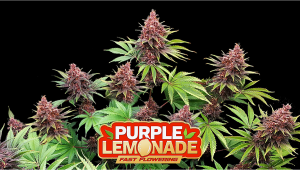
- 1. Grow specification
- 2. Grow set up
- 3. Germination and seedling stage | week 1
- 4. Early veg | week 2
- 5. Mid veg | weeks 3-6
- 6. Transition (pre-flower) | week 7
- 7. Early flower | weeks 8-9
- 8. Mid flower (bulk phase) | weeks 10-11
- 9. Ripening and harvest | week 12 (and beyond)
- 10. The outcome
- 10. a. Purple lemonade ff yield
- 10. b. Purple lemonade ff smoke report
- 11. In conclusion
Purple Lemonade Fast Flowering stands out as a captivating strain, born from the fusion of purple and citrus Cali genetics. This unique hybrid offers a well-balanced high, blending cerebral and body effects that are ideal for daytime enjoyment. Its mood-boosting properties and muscle-relaxing characteristics make it a versatile choice.
The strain boasts visually striking buds with pinkish-purple hues, accentuated by lilac trichomes. The aroma is a delightful mix of tart lemon with underlying fruity notes. Purple Lemonade FF is an excellent option for growers, featuring a relatively short flowering cycle and a robust structure. Its flavor journey, from sour citrus to sweet berry, adds to the overall appeal of this exceptional strain.
1. Grow Specification
Purple Lemonade Fast Flowering is a grower's dream, boasting an almost perfect genetic balance (55% Sativa / 45% Indica). Its XL size and robust structure make it a standout choice for cultivation. With a flowering period of 7-8 weeks, this strain efficiently produces visually striking buds. Indoors, expect a generous harvest ranging from 450-550 gr/m2 (1.5-1.8 oz/ft2), while outdoor growers can anticipate a no less bountiful yield of 350-550 gr (12-20 oz) per plant. The plant reaches a towering height of up to 200 cm (70-80 inches), making it a visually stunning addition to any garden.
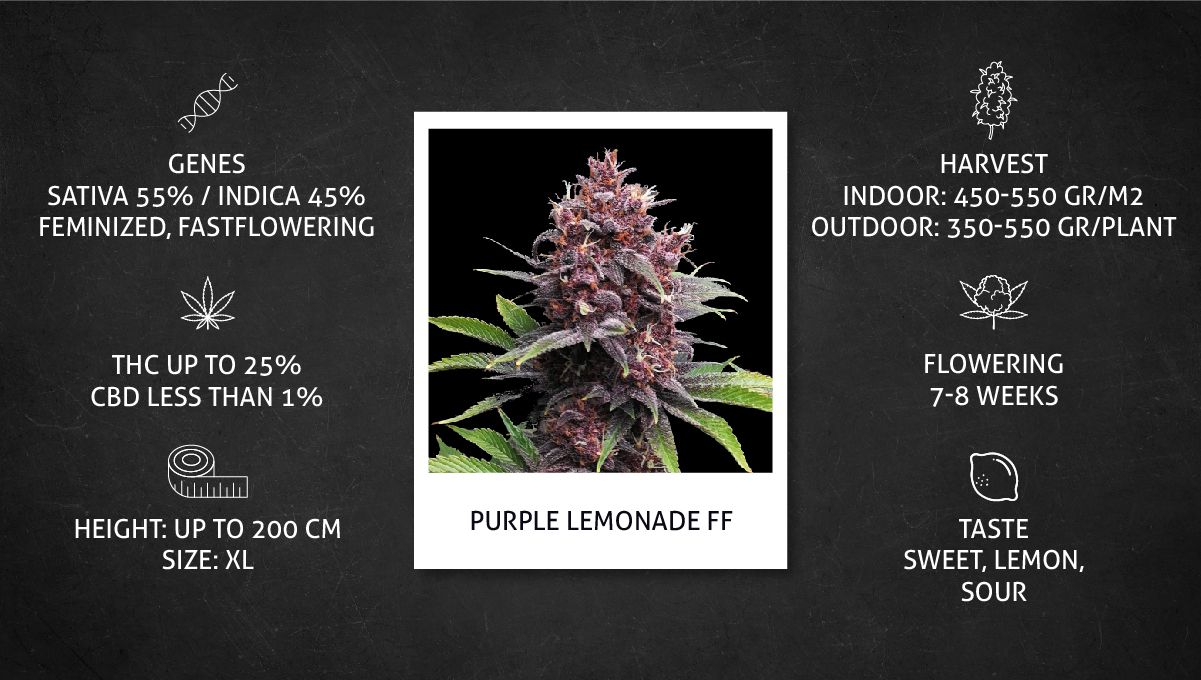
When it comes to consumption, Purple Lemonade FF offers an enticing sensory journey. With a THC content reaching up to 25%, this strain delivers a potent and delightful experience. The taste profile is a delectable combination of sweetness, lemon, and a touch of sourness, making each inhale a flavorful adventure. Whether you're seeking a creative boost or looking to unwind, the balanced Sativa/Indica genetics create a high that is both uplifting and relaxing.
2. Grow Set Up
Purple Lemonade FF was immediately embraced by the weed growing community, and so we have found enough well-documented grow diaries featuring this strain. Undortunately, there were no finished reports for outdoor cultivation of this strain at the time of writing, but if you plan an indoor grow, there's enough data for your reference. In the table below, you'll find some details for the four grow cycles we are going to follow.
| Grow Space | Light | Medium | |
|---|---|---|---|
| A | 0.3 m2 | 465W LED | Soil/Perlite |
| B | 0.3 m2 | 780W LED | Plant Mulch |
| C | 0.16 m2 | 320W LED | Soil, Coco Coir, Worm Castings |
| D | 1 m2 | 310W LED | Bio Bizz Light Mix |
All this data shows you that no matter what grow space, light, or medium you choose, Purple Lemonade FF will flourish in any of them.
3. Germination And Seedling Stage | Week 1
The importance of right environment indoors is obvious as it's up to you to provide your garden with optimal conditions in terms of temperature, humidity, light intensity, air exchange, and even CO2 levels. In the beginning of your Purple Lemonade FF life cycle, the most important characteristics are warm temps (see Grower A in the table below) and high relative humidity (Growers A and B). Keep these parameters at the same level, and your seedling will get the best possible start in life.
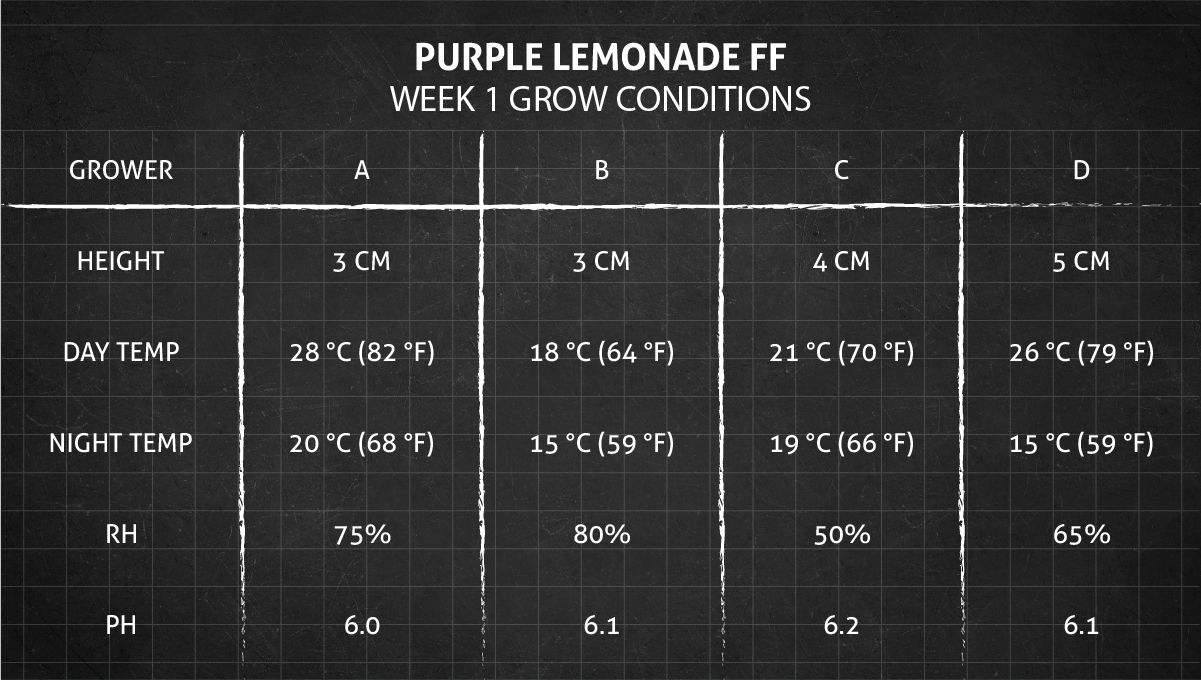
Germinating cannabis seeds is a fundamental yet crucial step in your cultivation journey. While it might seem simple, many beginners face challenges. Fear not, for we shall guide you through the process. Begin with the straightforward method of placing the seed between moist paper towels.
Check every 12 hours, ensuring the seed cracks and reveals a taproot. Use pure water without nutrients, though rooting boosters are acceptable. No need to fuss over pH at this stage; simplicity ensures successful germination rates.
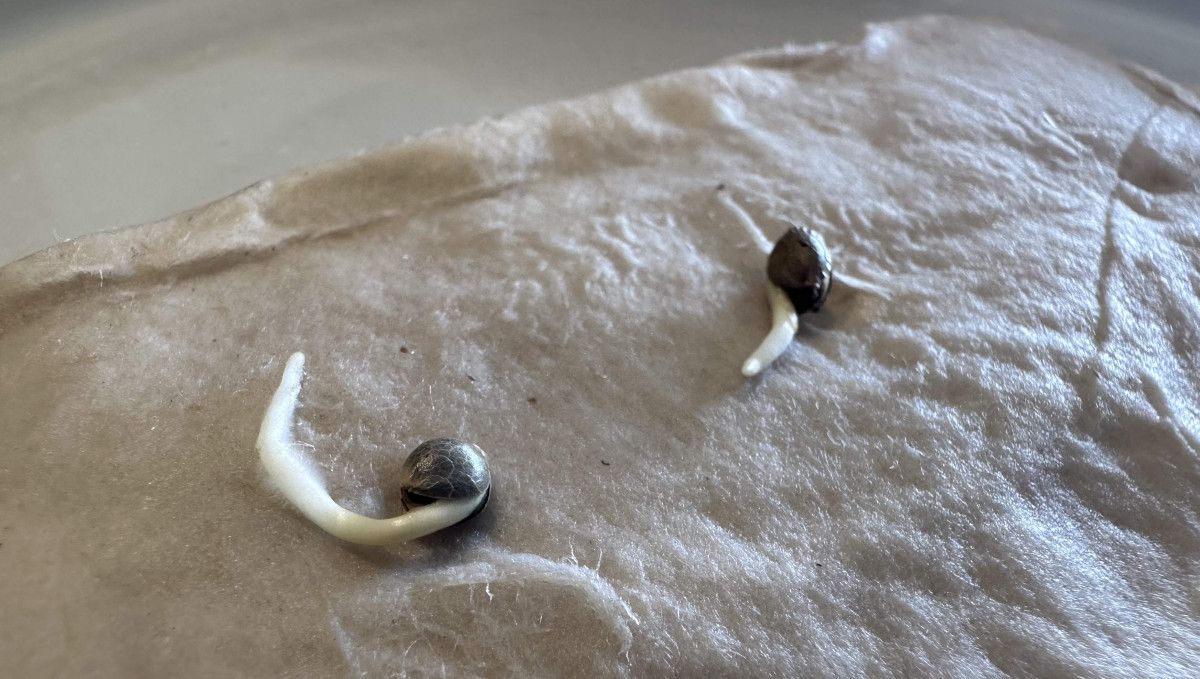
An optional step in germination is pre-soaking seeds on water's surface. Allow the bean to float, letting moisture soften the hull and awaken the embryo. Be cautious; prolonged submersion may suffocate the embryo.
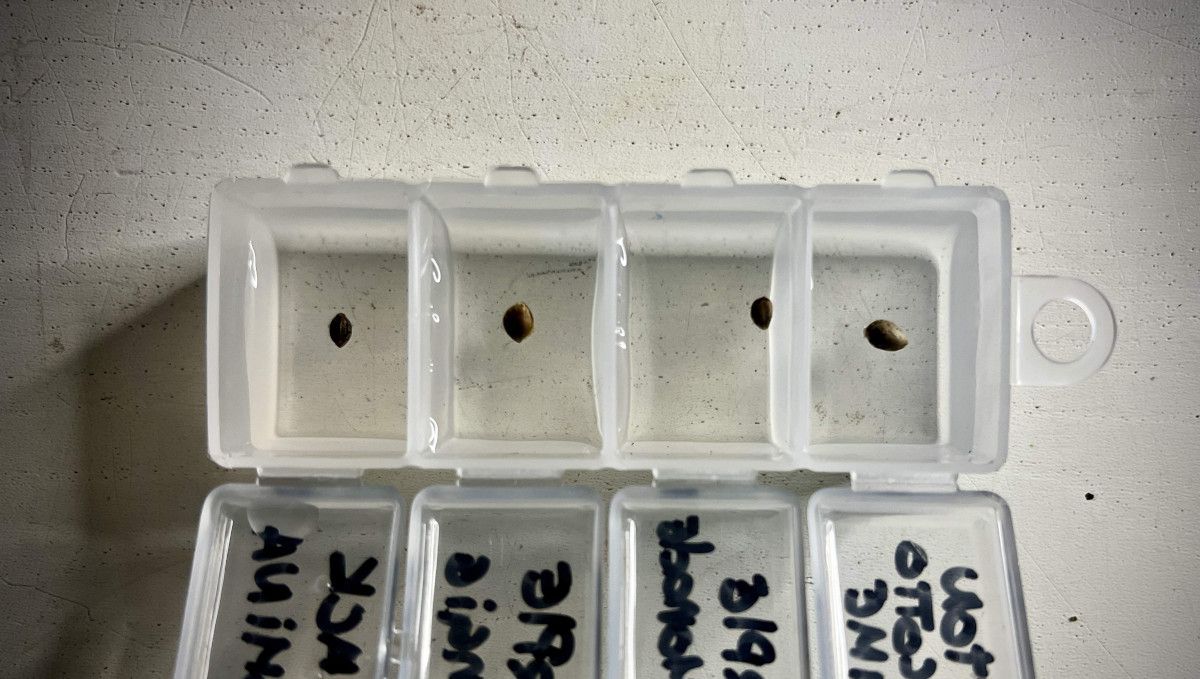
After pre-soaking, place the seeds between paper towels, plant them directly into moistened soil, or insert them into jiffy or rockwool plugs for added convenience. Plugs maintain optimal moisture levels effortlessly.
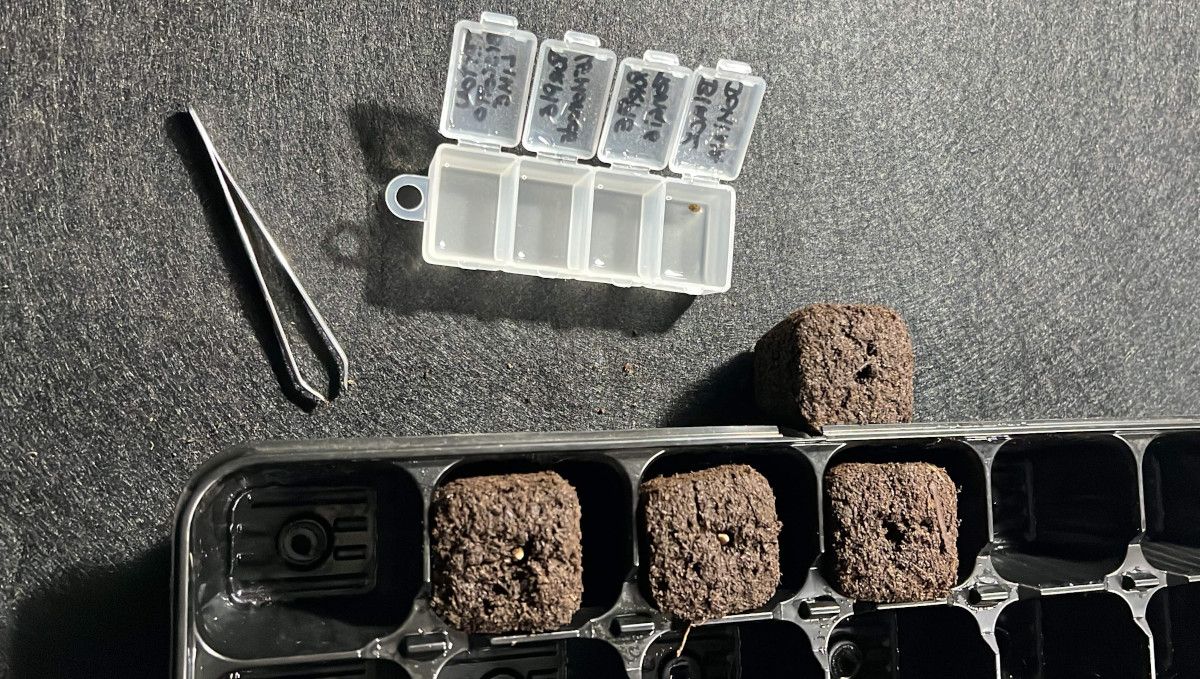
Once the seed emerges, it's a positive sign to proceed with planting. Whether in a starter pot or the final container, the choice aligns with your cultivation plan. Plugs shine here, offering easy insertion without disturbing the emerging root structure.
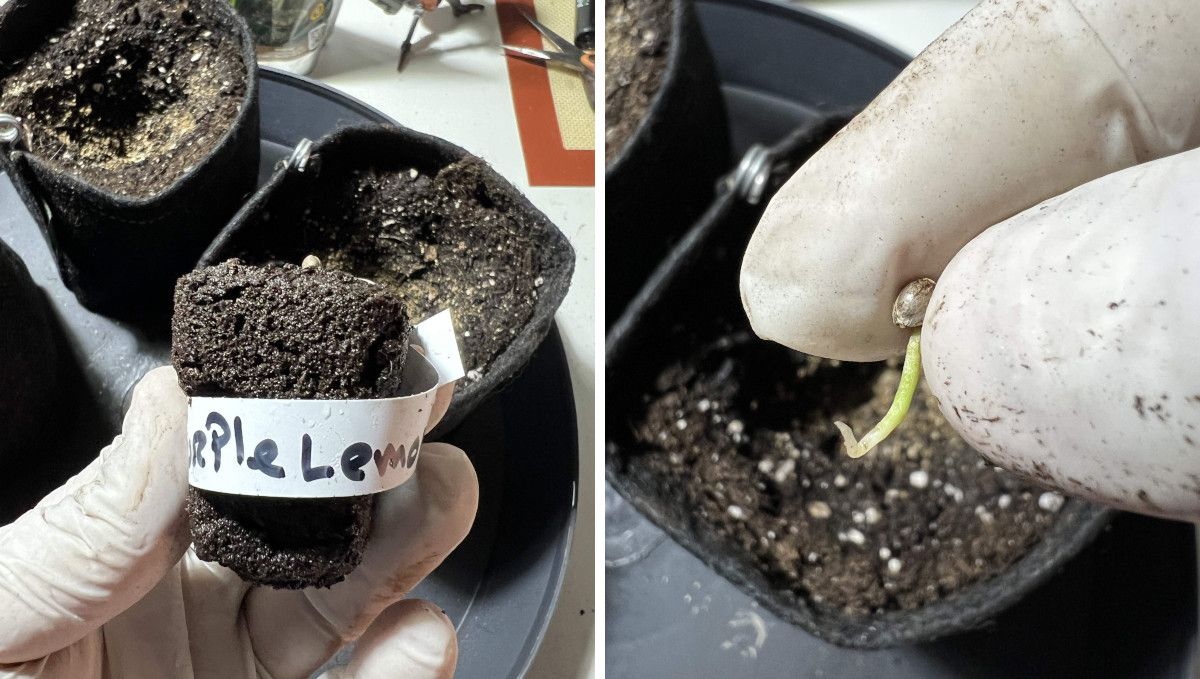
Humidity plays a pivotal role. High humidity aids shell shedding during sprouting and prevents excessive moisture evaporation. If maintaining ideal humidity proves challenging, a humidity dome over the seedling is a simple solution.
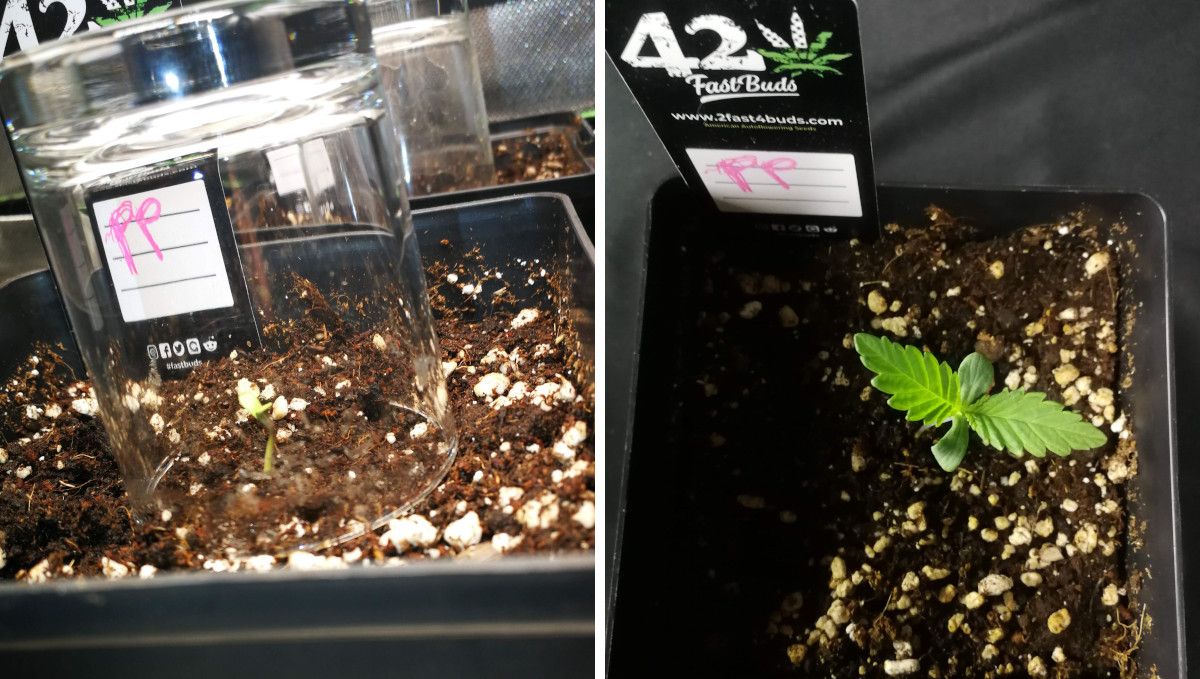
Post-emergence, provide light on an 18/6 to 24/0 schedule. Balance is key—maintain an appropriate distance from the light source. Too close risks harsh exposure, while too far leads to stretching. Your goal as a grower is finding the sweet spot, allowing the sprout to stretch slightly without bending or toppling over.
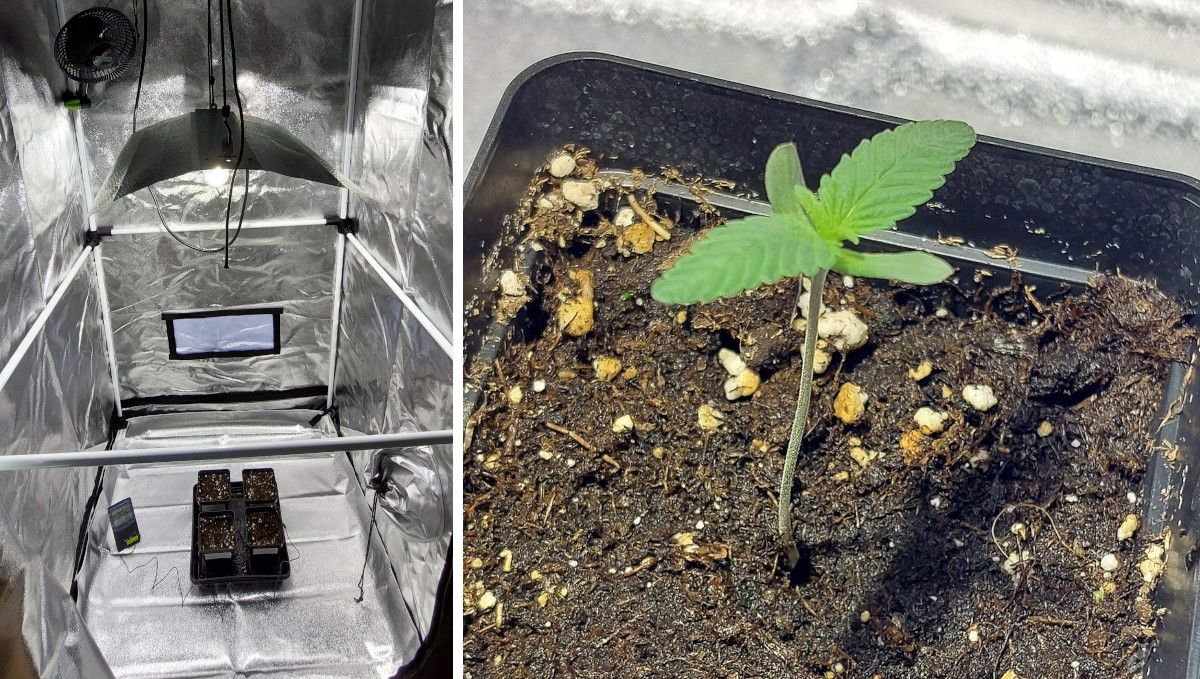
4. Early Veg | Week 2
In the second week from sprouts, weed plants still need an environment that doesn't put any additional strain on them. Warm day temperatures, a slight drop for the nighttime (if you chose to turn off the light for a few hours every day), and the relative humidity higher than 60% are still your best bets.
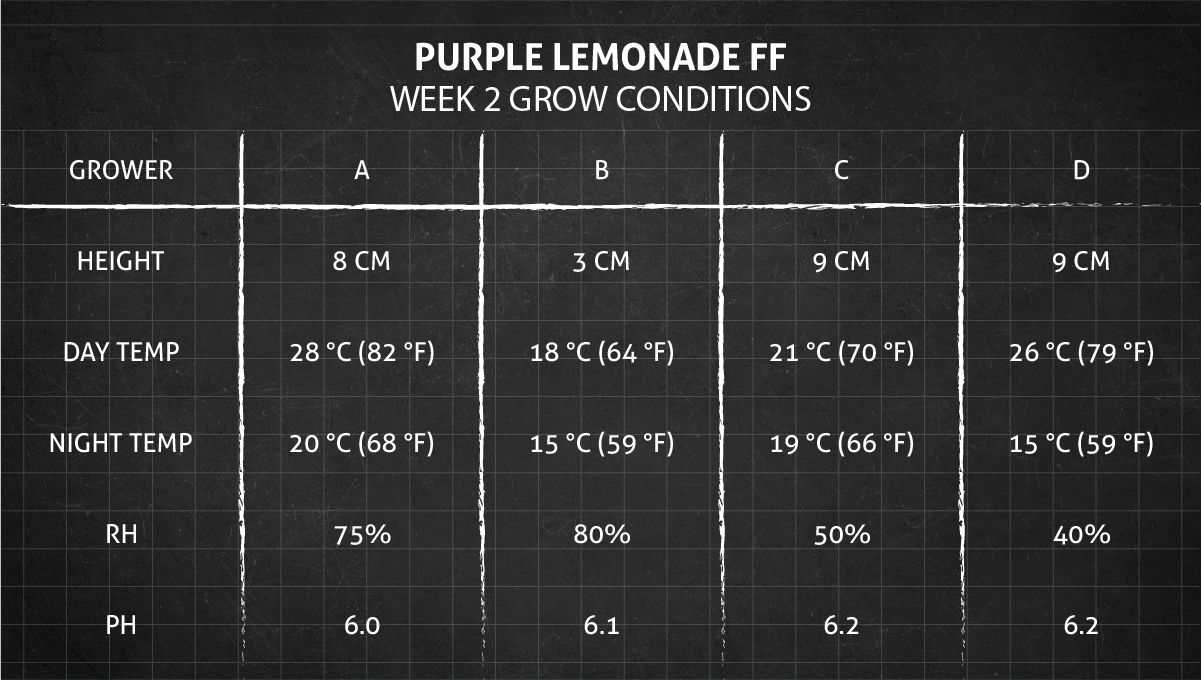
Entering the seedling stage marks a critical phase where the development of new leaves begins to gain momentum, albeit modestly, in the second week. Although the growth rate may appear sluggish, rest assured that beneath the surface, crucial processes unfold. The plant is actively establishing an extensive root system that colonizes the entire available medium.
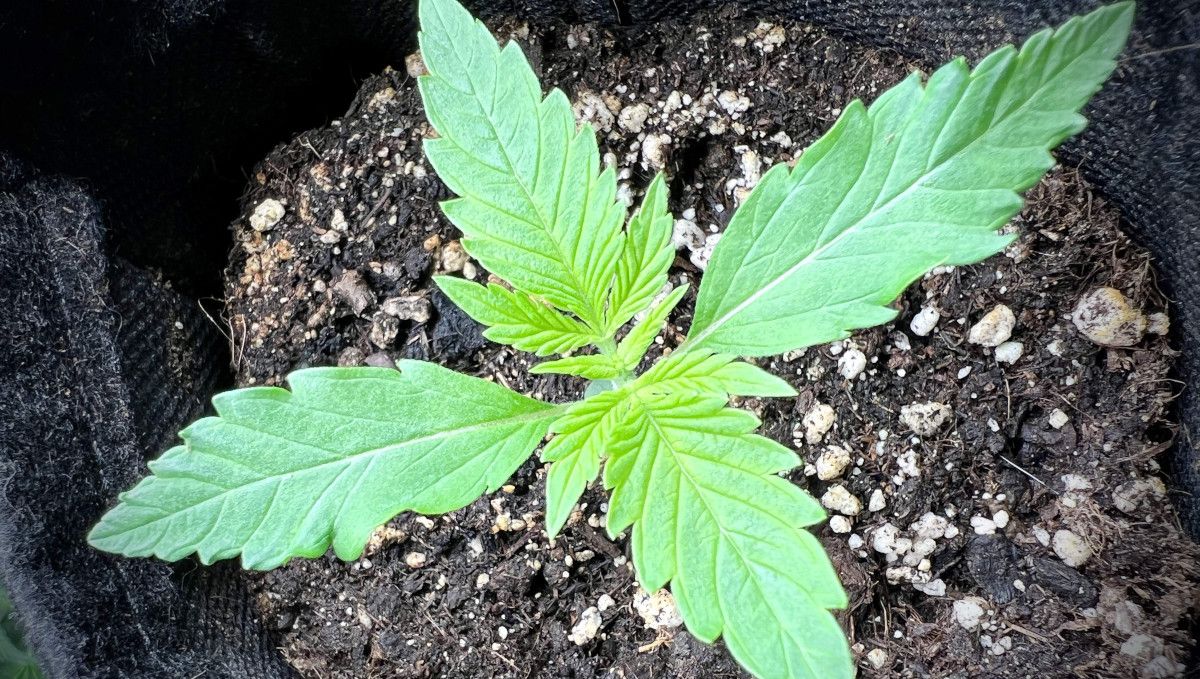
A reliable indicator of your plant's well-being lies in its daily changes. Watch for each new pair of true leaves surpassing the previous ones in size and leaflet count. Around day 10, the first and second pairs achieve similar sizes, while the second pair continues to broaden, and the emergence of the third pair is underway.
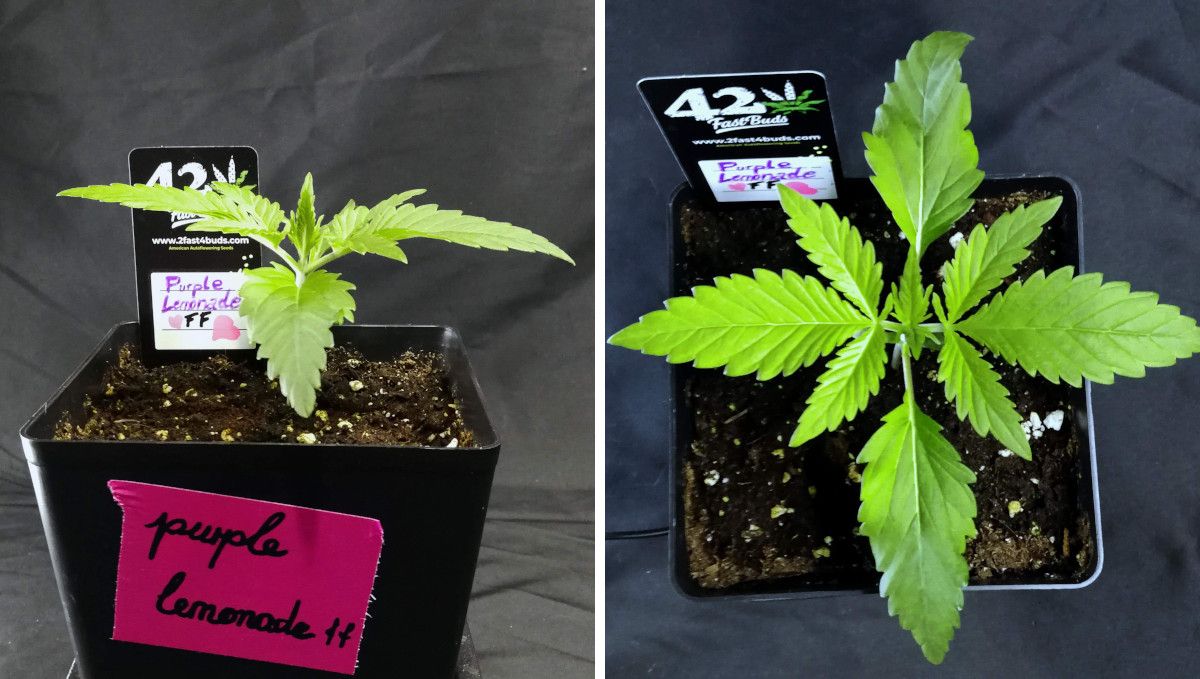
Early signs of side growth at the nodes are promising, signaling the strain's bushy nature with the potential for multiple same-size colas at harvest. While this tendency can be further enhanced through training, not every grower ventures into canopy management this early. It's generally safer to defer such practices until the next week.
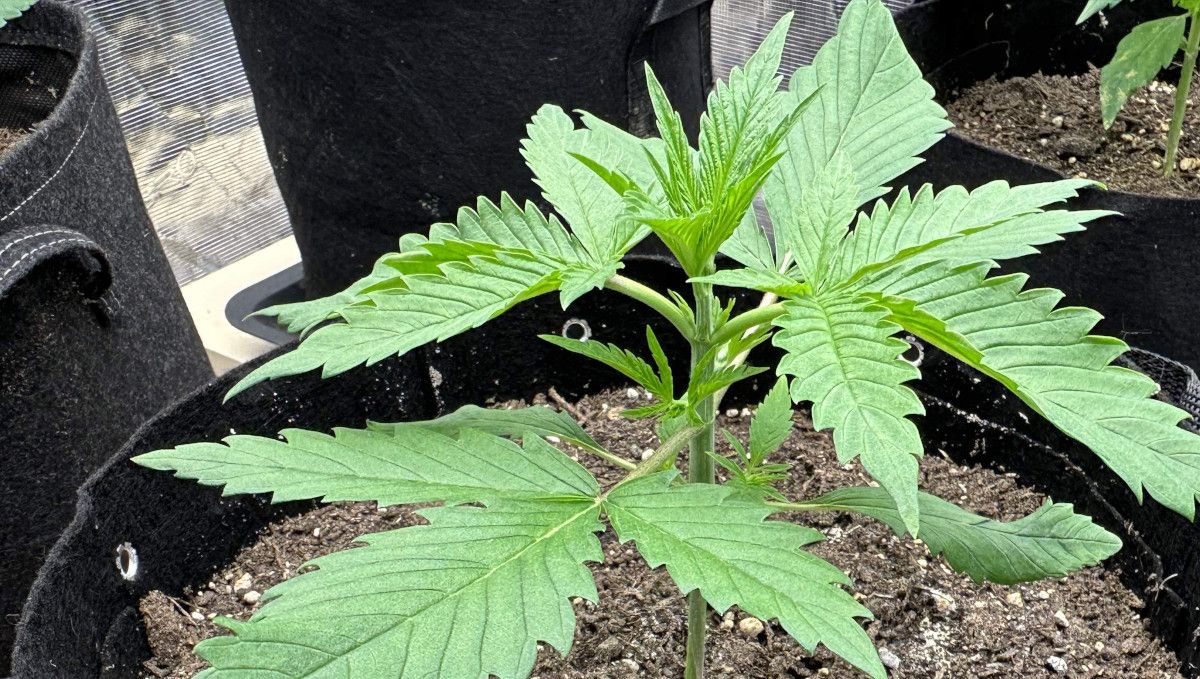
For growers concerned about potential overgrowth by harvest, early training becomes a viable option. This precaution is acceptable as long as the plant thrives in health and vigor. Even high-stress procedures like topping can be considered at this stage, complemented later by low-stress training to craft a compact and level canopy.
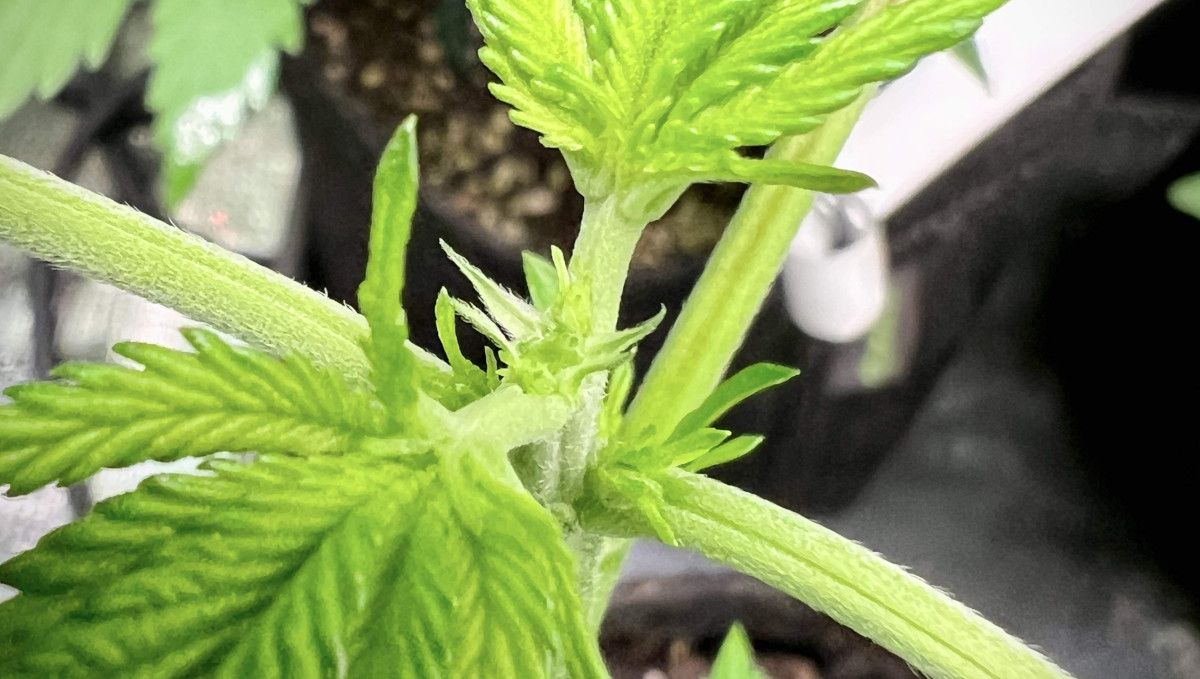
5. Mid Veg | Weeks 3-6
The vegetative phase marks the first spurt in growth when the new branches and leaves emerge and develop explosively. As the plants get taller, it's imperative to ensure the right distance between the light and the plant tops. You can pay less attention to maintaining perfect conditions as the plant is now mature and robust enough to thrive at lower temps and RH than in the weeks before.
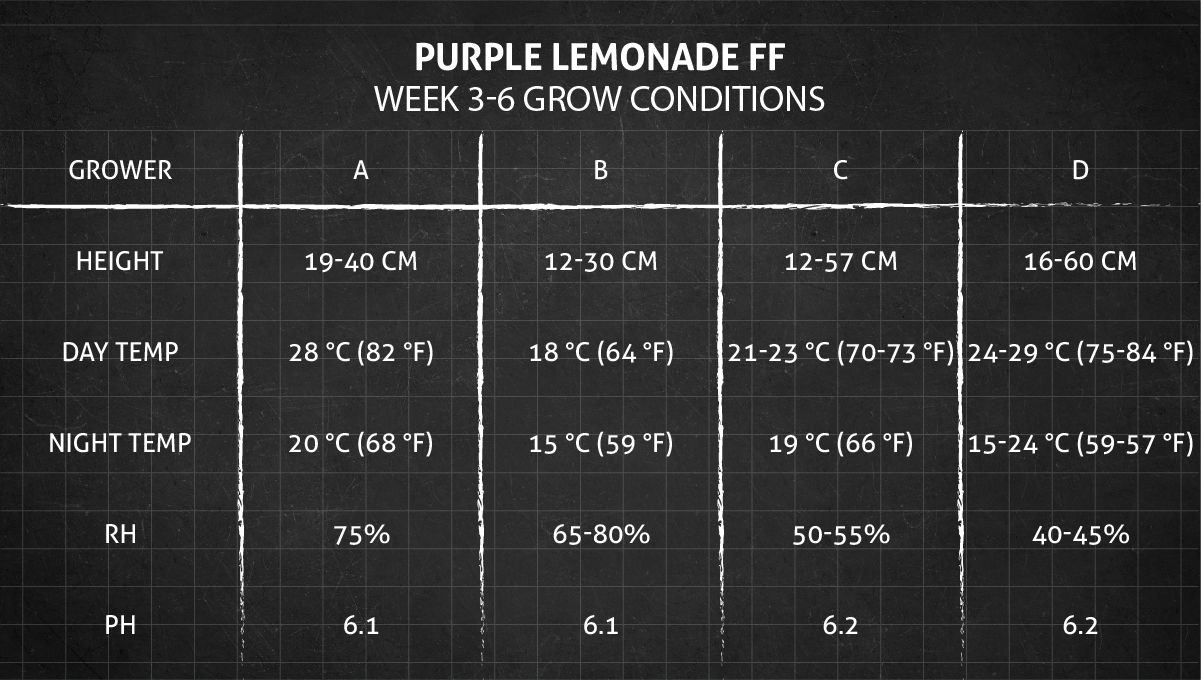
Transitioning beyond the initial two slow weeks from seed, your cannabis plants embark on a phase of explosive growth. Witness the transformation as new leaves enlarge, the central stem stretches considerably, and side branches proliferate from every node, creating a lush, bushy appearance.
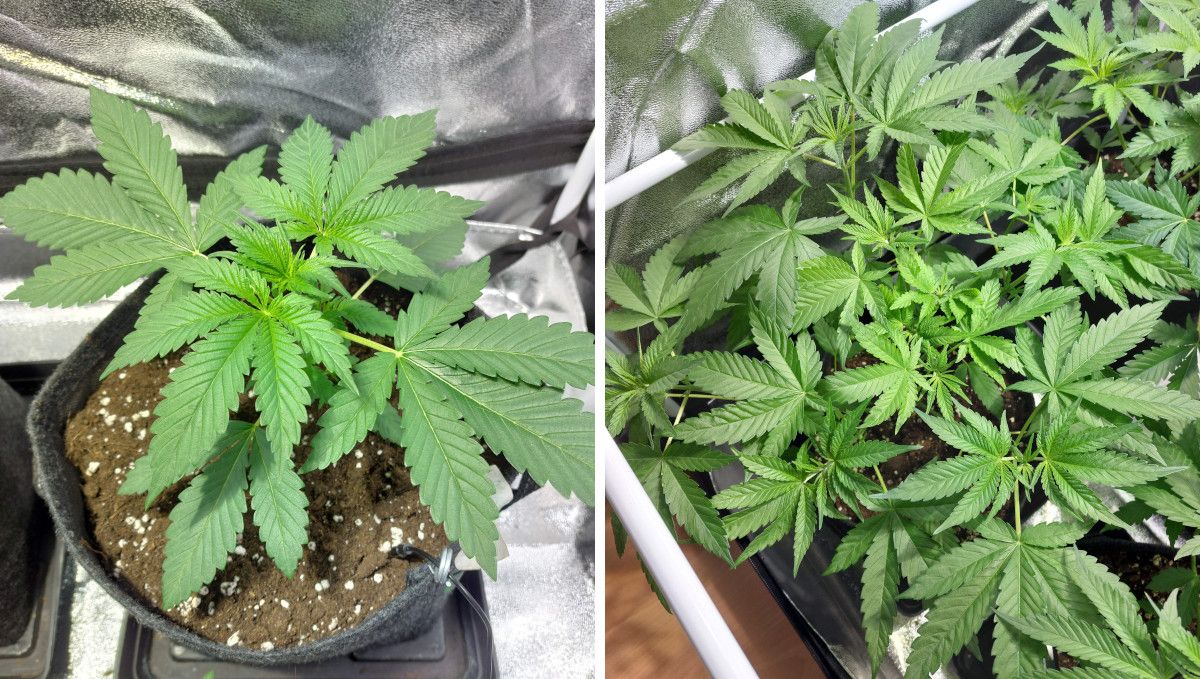
The rapid growth above ground necessitates a robust root system, requiring an ample volume of medium. For those who opted for a starter container in the early veg phase, it's time to consider transplanting into a larger pot, be it the final container or an intermediate one.
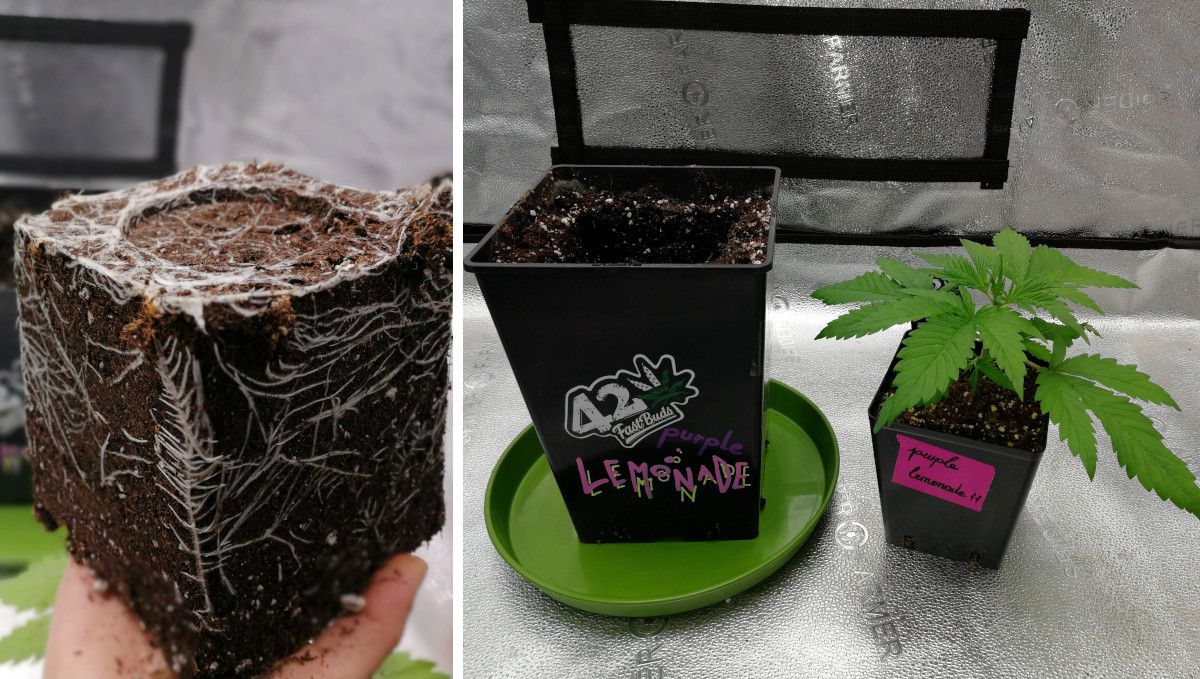
Transplanting, while beneficial, is a potential stressor. Execute the procedure swiftly and, most importantly, prevent the root ball from disintegrating. Timely watering is crucial: overly wet medium leads to whole chunks of it falling off during repotting, while overly dry medium crumbles, jeopardizing root cohesion. Maintain the medium's moisture for optimal transplant success.
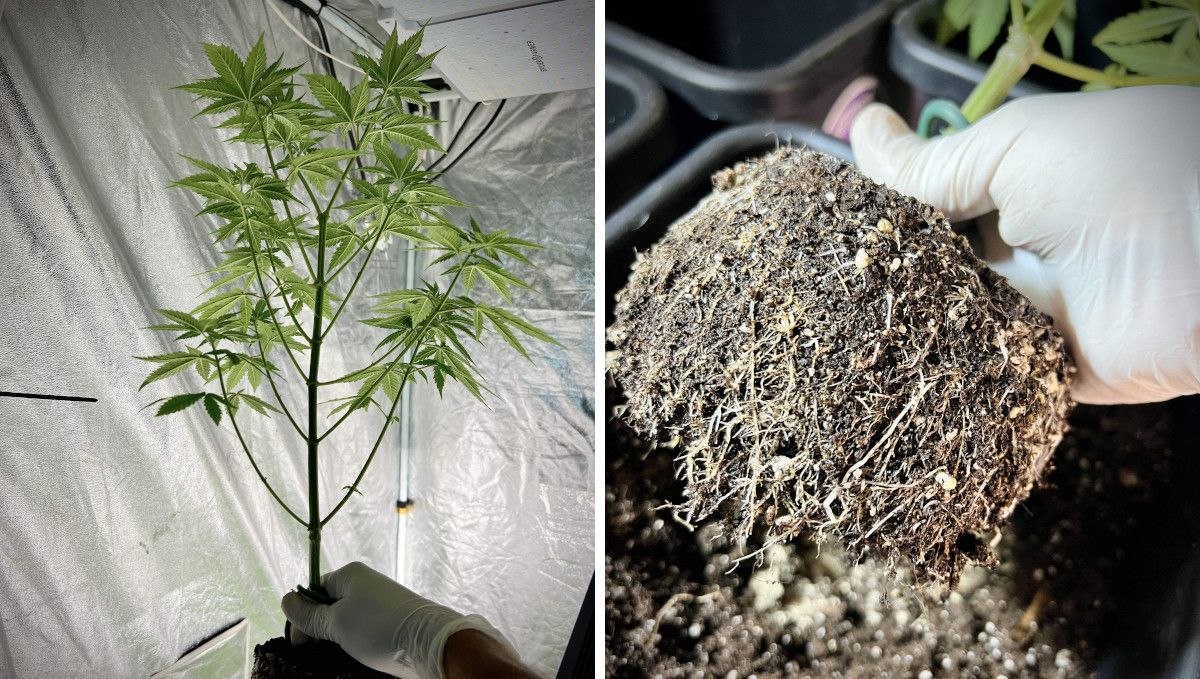
Depending on pot volume and medium richness, supplemental feeding may be necessary to support vigorous vegetative growth. Begin conservatively, starting with 1/2-1/4 of the recommended fertilizer dosage and adjust as needed. In the vegetative phase, prioritize nitrogen as the key macronutrient.
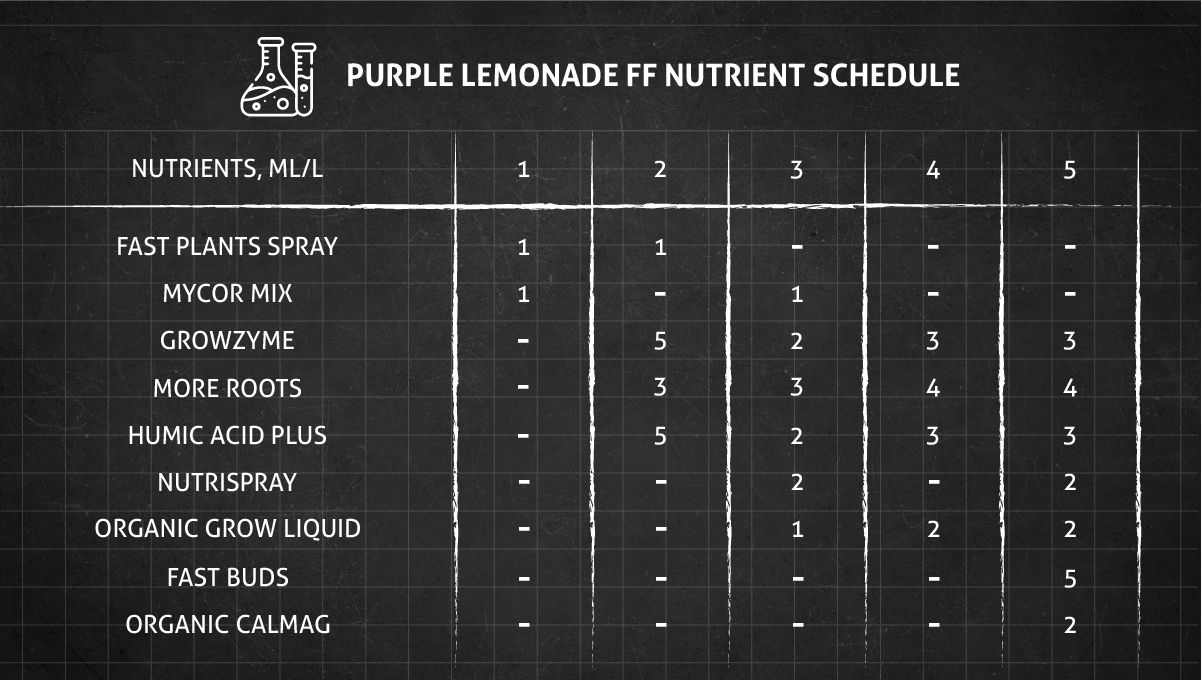
The vegetative stage is prime for topping, the removal of the plant's growing point. Capitalize on the plant's robust health and vigor during this stage to handle the stress of topping.
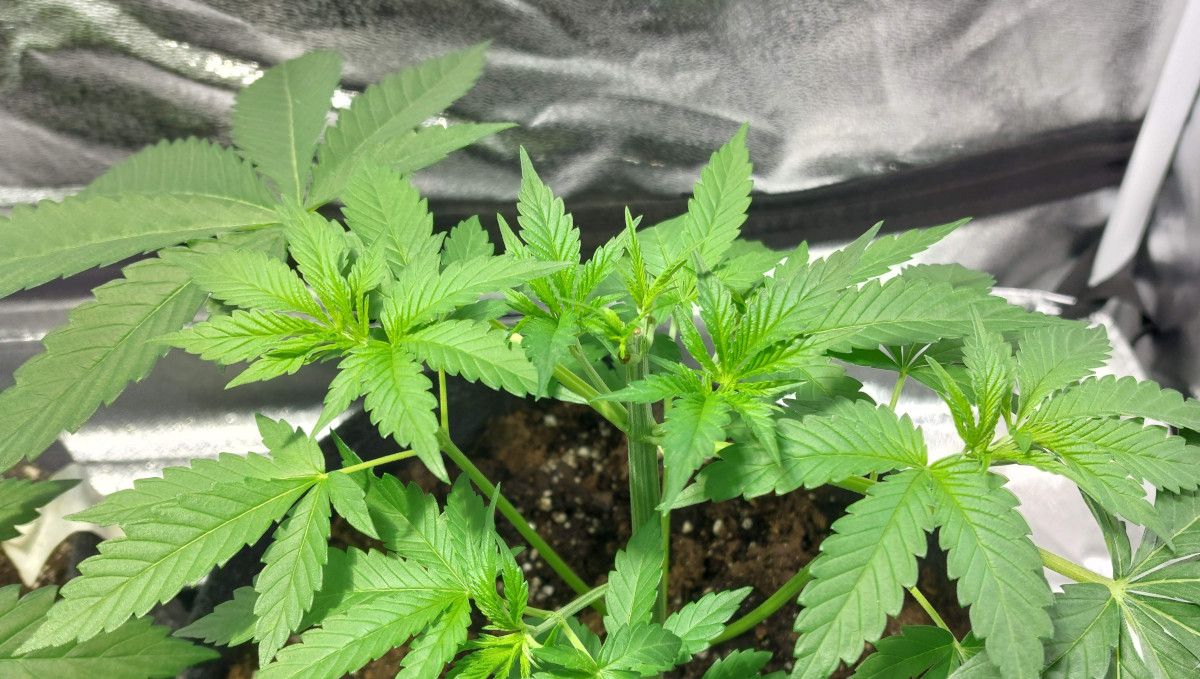
Topping fosters a bushier plant, but to control height effectively, combine it with low-stress training (LST). LST involves bending and spreading branches horizontally, preferably starting with the main stem for optimal efficiency.
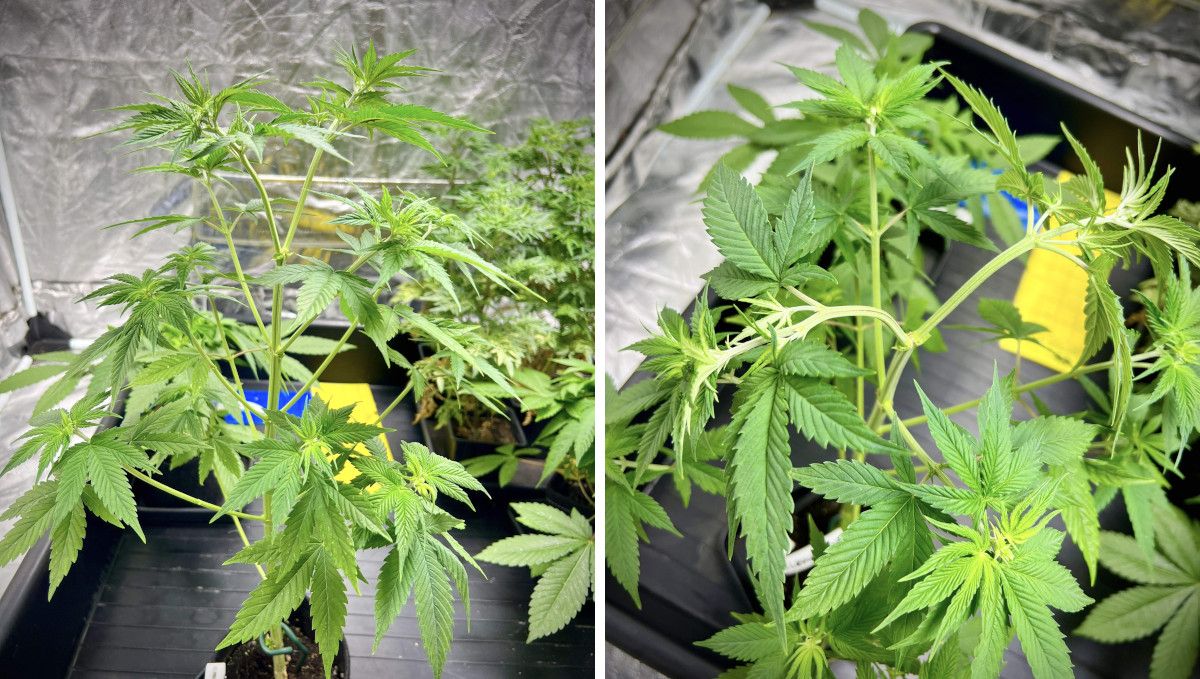
For advanced height control, embrace one of the most powerful low-stress training methods: ScrOG (Screen of Green). This technique utilizes a horizontal net to restrict vertical growth while providing branches with support and structure.
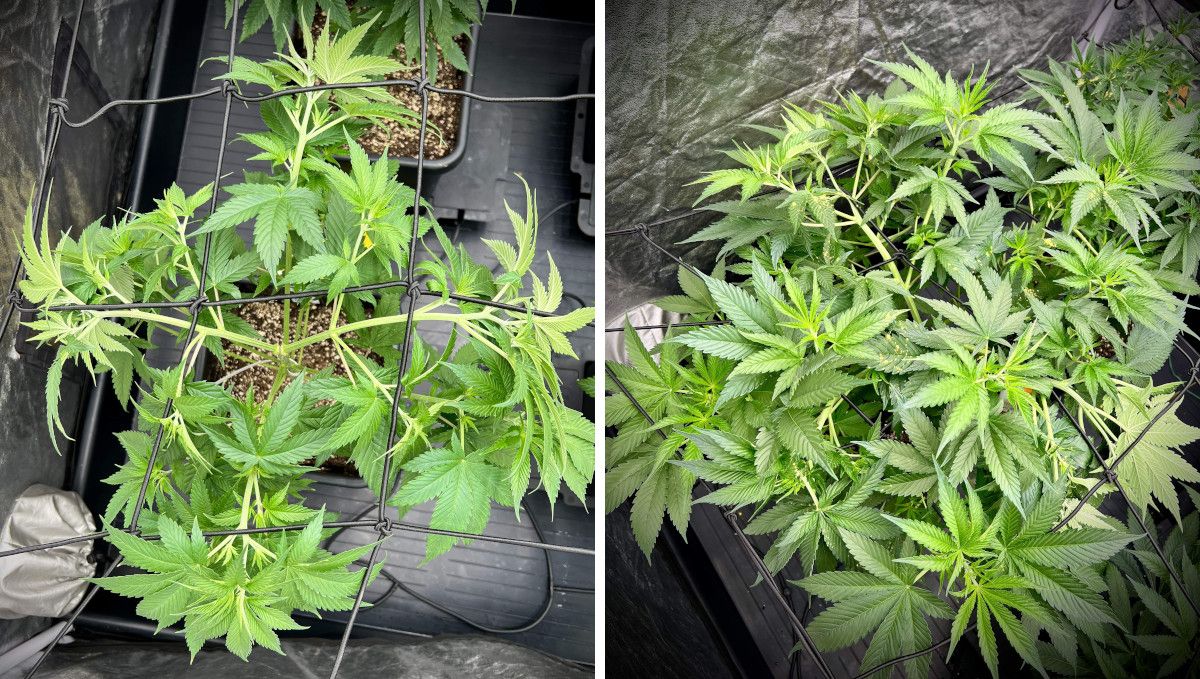
6. Transition (Pre-Flower) | Week 7
When deciding on the right parameters for your weed garden, never forget about pH levels. This is something that determines whether plant roots can efficiently absorb nutrients or not. The best readings on your pH-meter are 5.5-6.0 in hydroponic setups, including coco coir, and 6.0-6.5 in soil grows. Monitoring pH is less importnat in organic cultivation but obligatory if you use synthetic fertilizers.
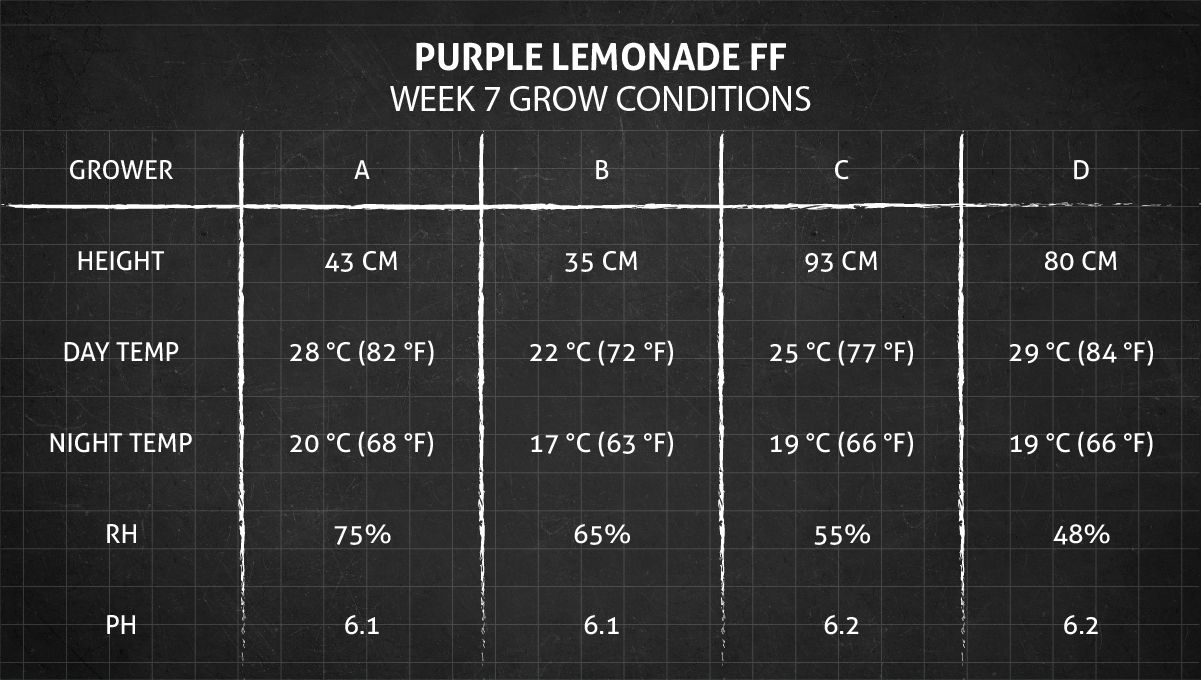
Purple Lemonade FF belongs to the category of photoperiod strains, indicating that it won't initiate bud formation until the light schedule is reduced to 12 hours of light and 12 hours of darkness. During this transition, anticipate the first signs of flowering to appear within approximately a week.
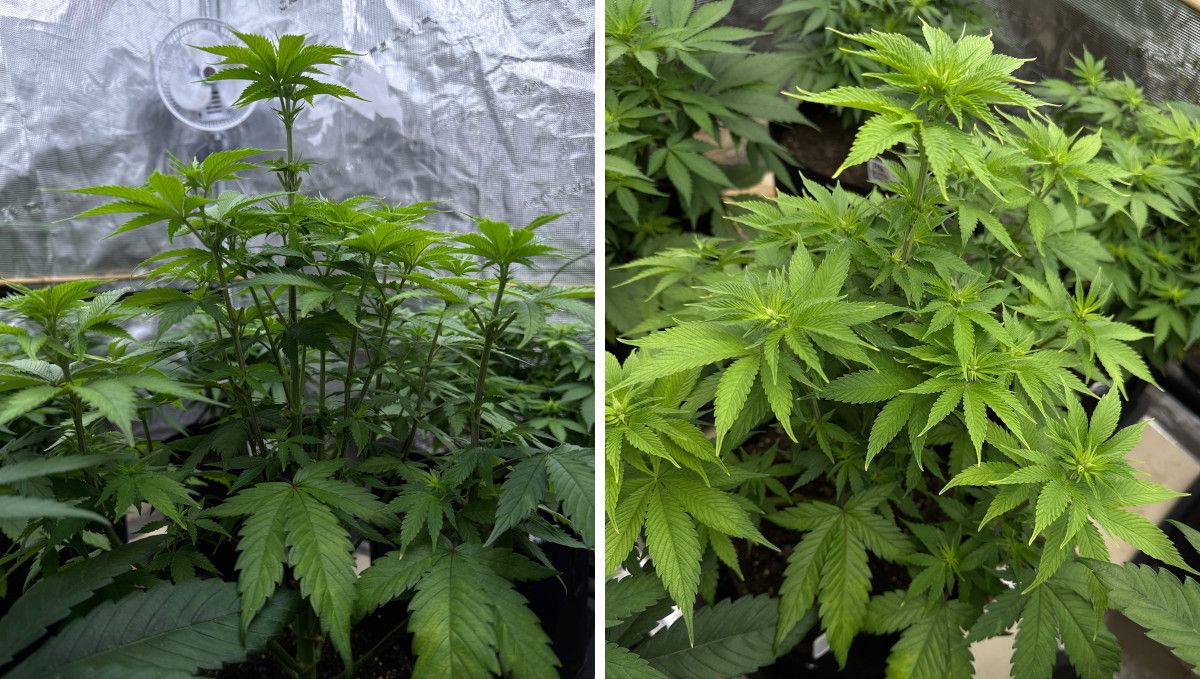
Female flowers exhibit distinct characteristics, notably tiny hairs known as pistils emerging from each calyx. Initially, these pistils become noticeable at middle nodes, requiring a close inspection within the canopy to detect. Later, the pistils on the top buds become more prominent.
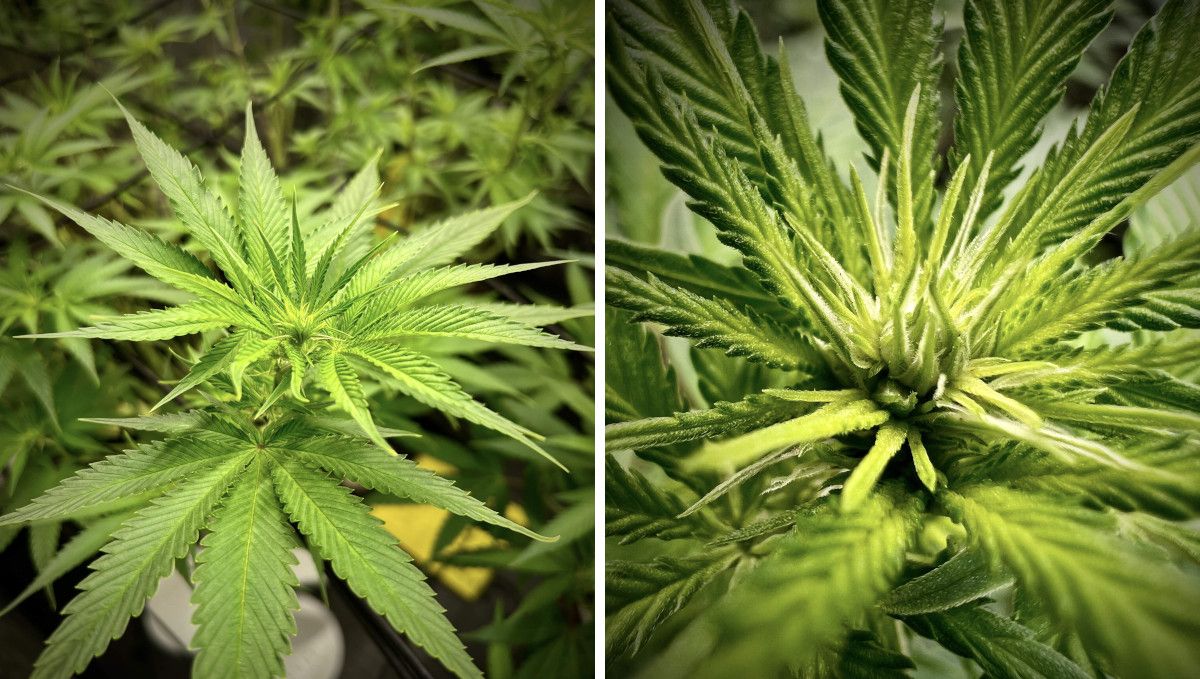
Maintaining a strict light schedule is crucial for photoperiod varieties during the dark period (night) to prevent any light leaks. Even minimal disruptions in the dark period can interfere with the proper development of flowers.
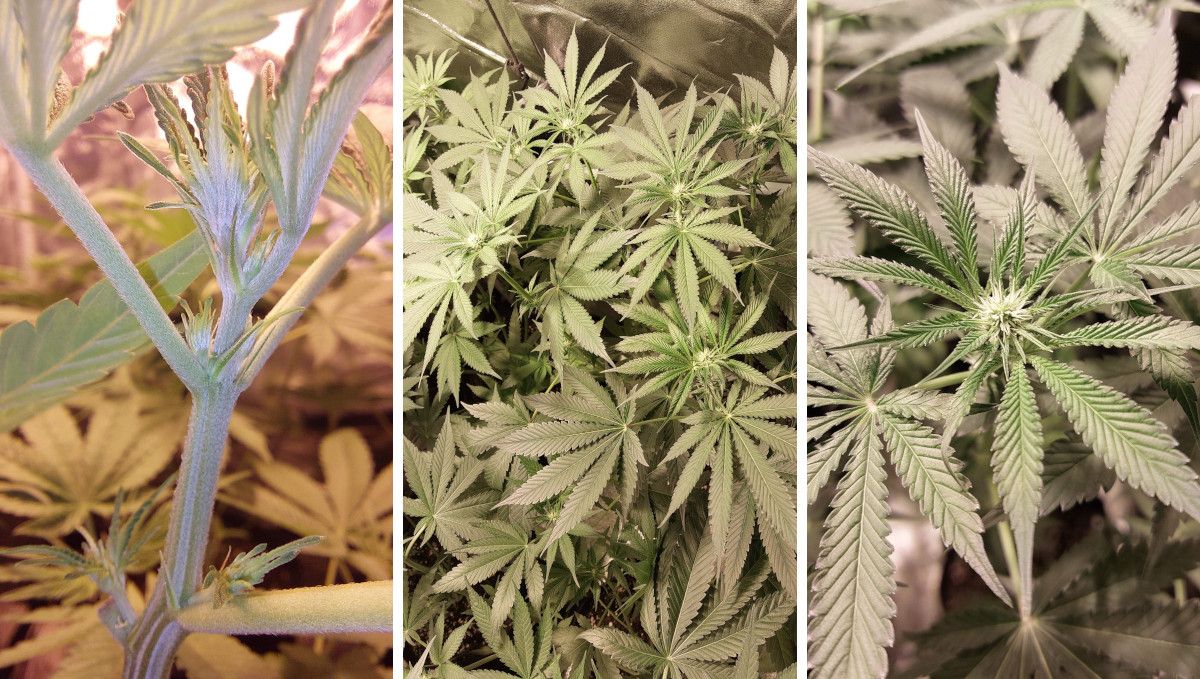
The most substantial and densely packed buds tend to develop at the top of the plant, while those situated further down the stem are comparatively smaller and of inferior quality. Therefore, ensuring a low profile for your indoor plant is essential to achieve optimal yields and enhance the overall appeal of the final product.
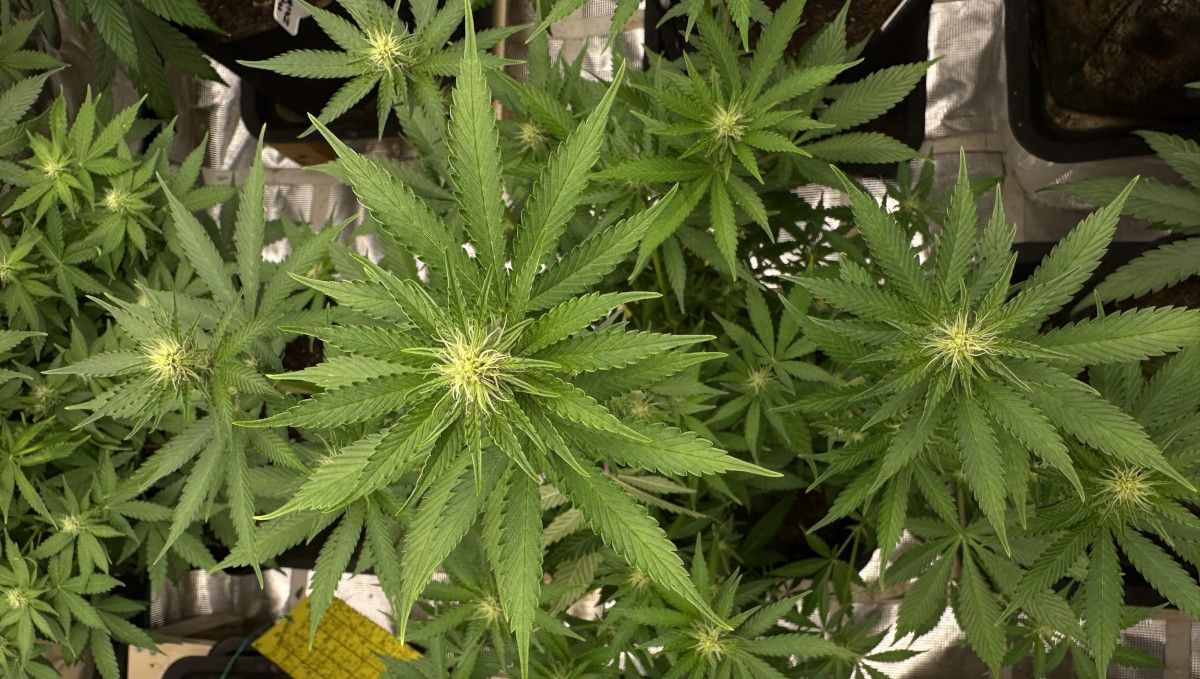
To facilitate light penetration to the lowermost bud sites, some growers opt for radical defoliation. However, it is advisable for beginner growers to exercise moderation in employing this technique until they become more familiar with the plant's stress tolerance and the procedure's impact on growth and yields. If a grower decides to undertake heavy defoliation, it should be done during the early stages of flowering to minimize the risk of irreparable damage to the plant.
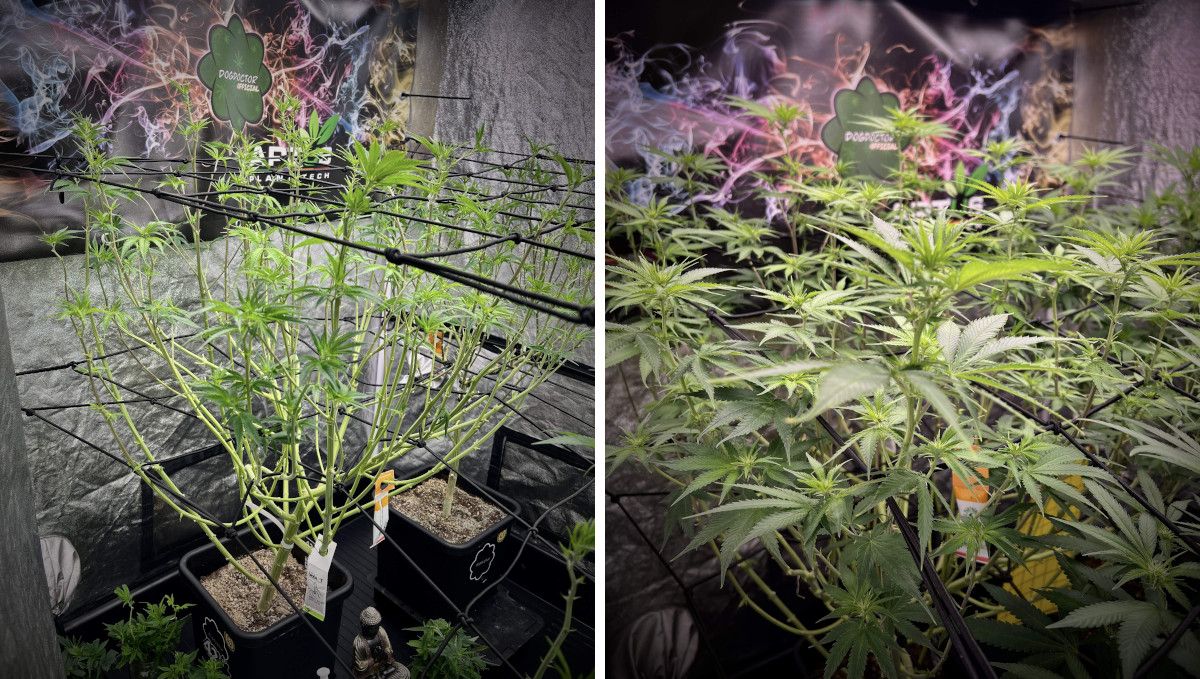
7. Early Flower | Weeks 8-9
During the early flowering stage pay special attention to the distance between the grow light and plant tops. We suggest that you should check your garden every day at lights on – branches are sometimes extending so fast that they may grow several inches taller overnight. Besides regultaing the distance, make sure the ventilation efficiently extracts heat from the grow tent as flowering cannabis prefers a cooler environment.
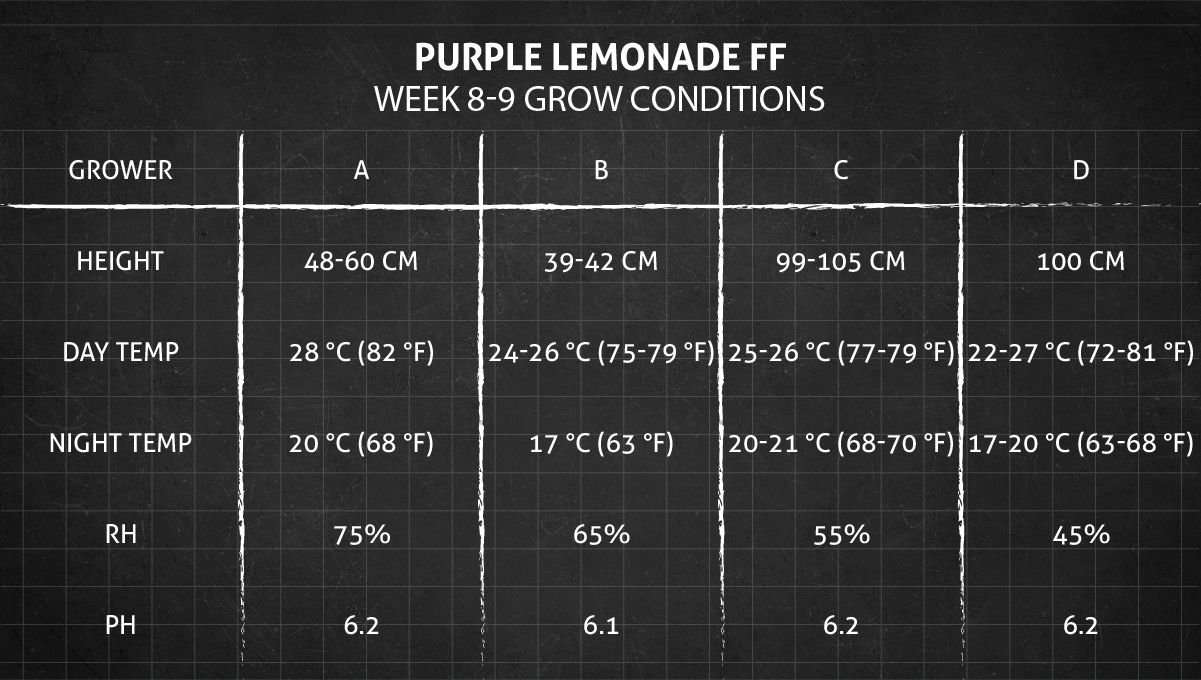
Contrary to common expectations, the shift to a 12/12 light schedule doesn't halt plant growth; instead, it triggers an accelerated phase of vertical expansion. The first flowers make their appearance, albeit appearing modest compared to the continuously extending branches.
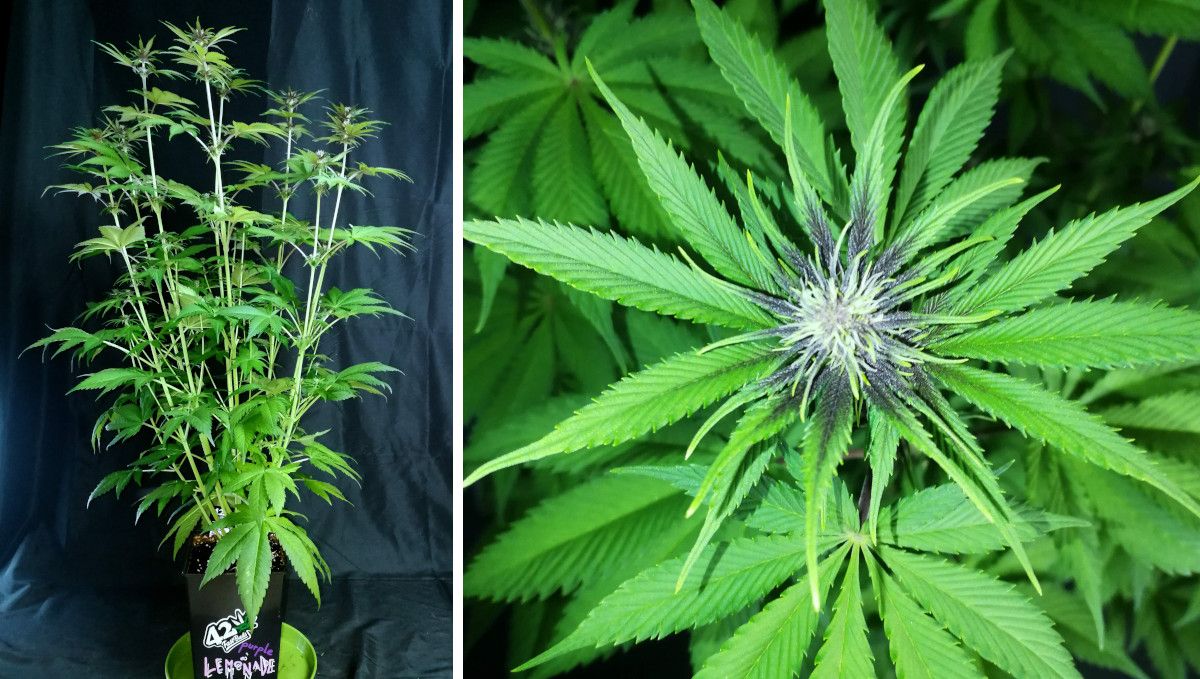
Over time, flowers gradually fill the space between nodes, evolving into what cannabis cultivators fondly refer to as colas.
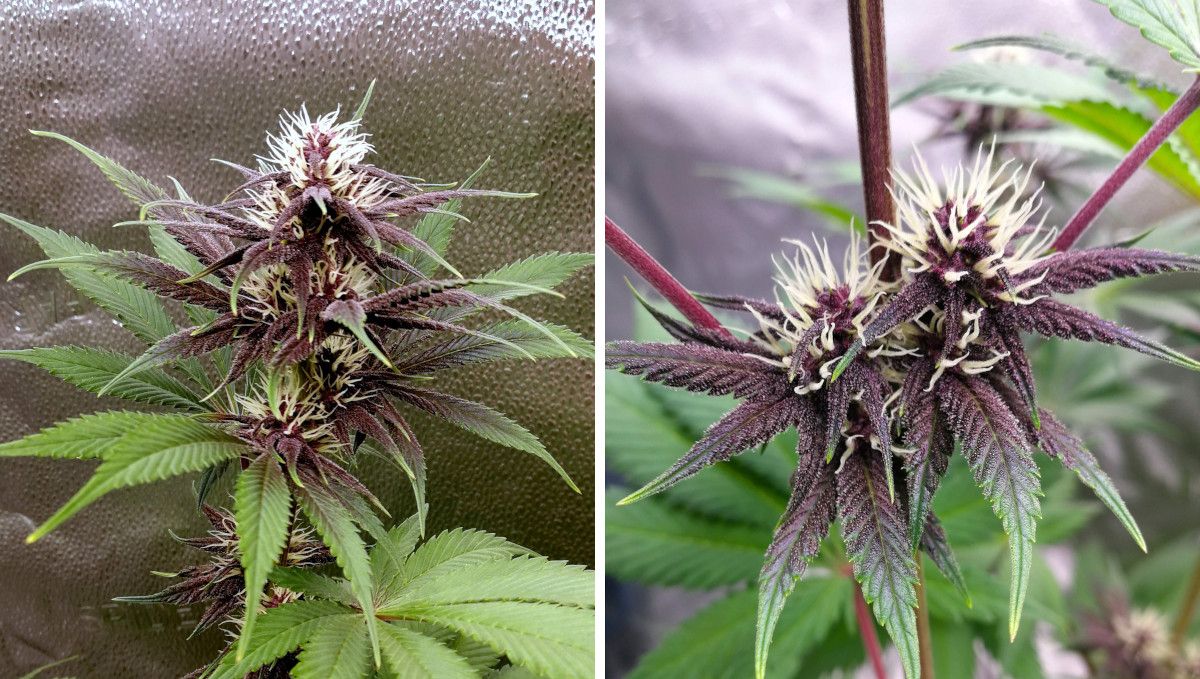
As the flowers emerge, especially in more resinous strains, a welcomed development unfolds—trichomes begin to blanket the flowers. These resin glands serve as the primary repositories of cannabinoids and terpenes in cannabis plants, often accompanied by a distinctive, potent aroma. For discreet cultivation, we advise growers to install a carbon filter to counteract the characteristic weed odor.
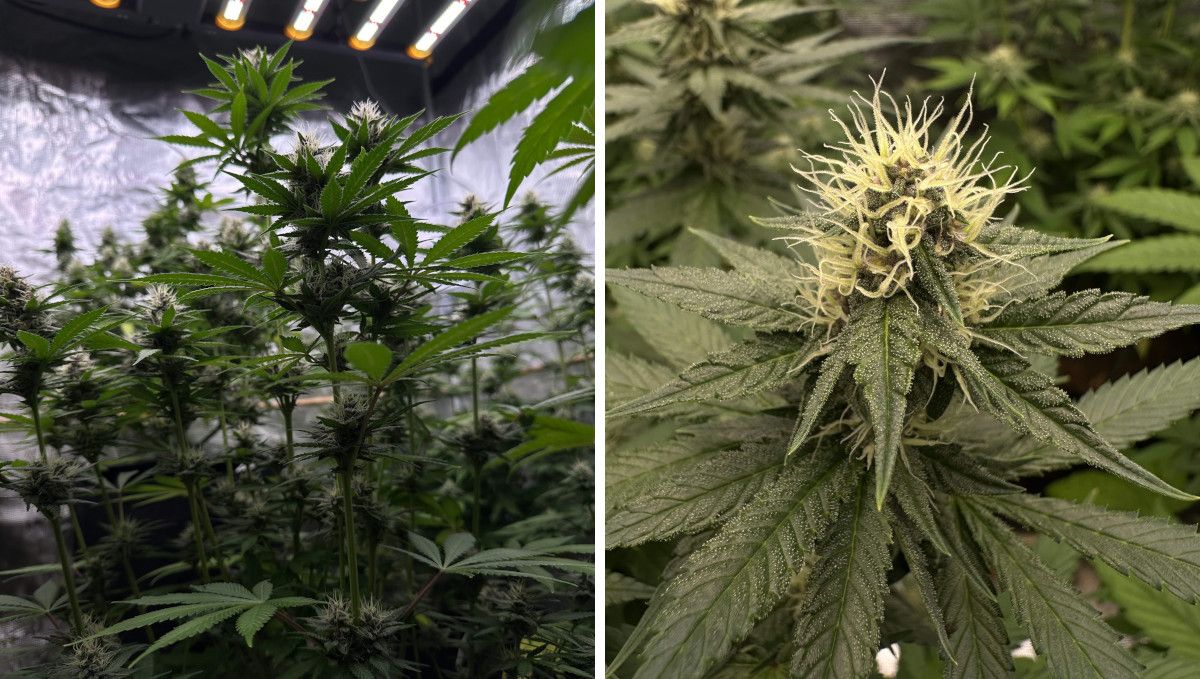
Both the stretching and bud formation demand heightened nutritional support. In the early flowering stage, consider providing plants with full or nearly full doses of nutrients recommended by the manufacturer. Opt for products designed for flowering cannabis, characterized by lower nitrogen (N) and increased phosphorus and potassium (P and K), as indicated by the NPK figures on the label.
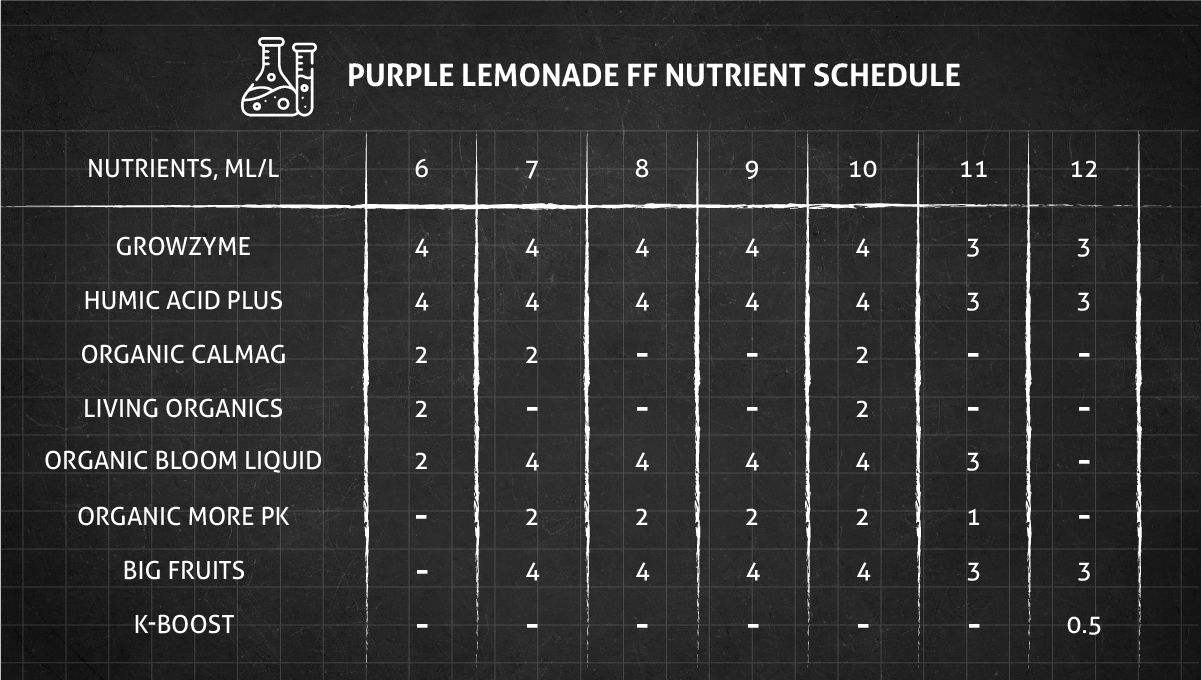
While nutrient supply remains crucial, the paramount factor during active flower growth is the amount of light. Maximize LED output by dialing up its intensity or reducing the light's distance from the plant tops. This strategic approach ensures your garden receives the optimal recommended light, nurturing vigorous flower development.
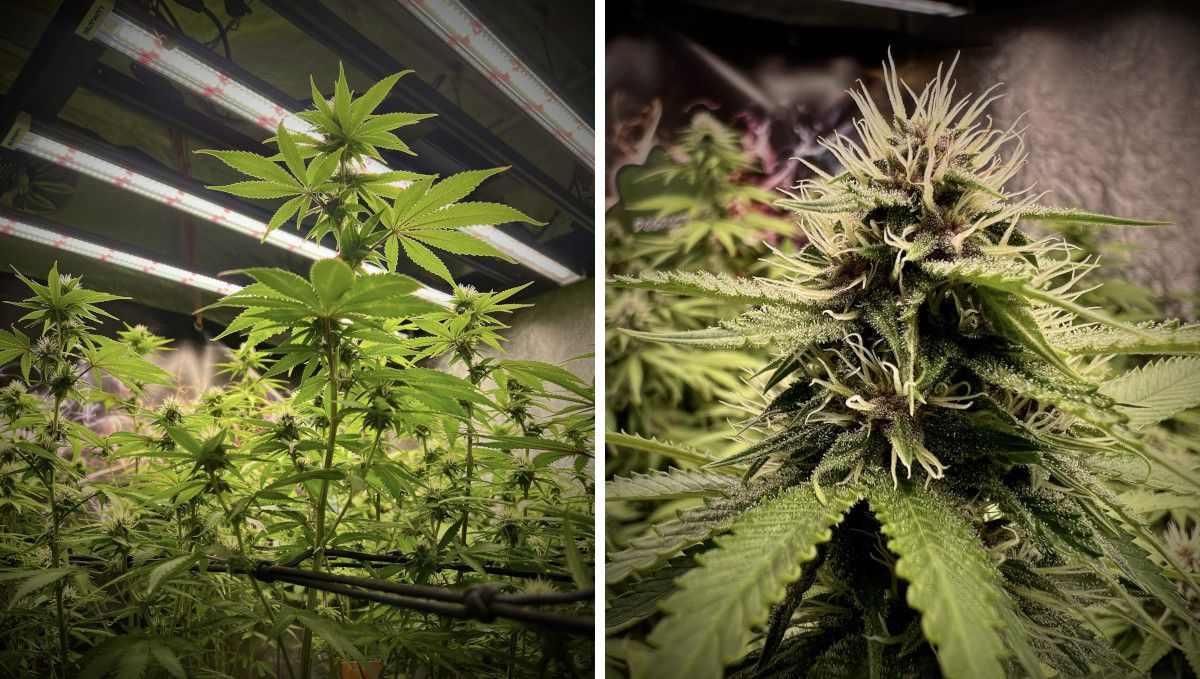
8. Mid Flower (Bulk Phase) | Weeks 10-11
When the buds start to fill out and mature, your primary focus should be on humidity control. The fatter the colas, the more the risk that mold, bud rot, or other fungal infections, such as powdery mildew, will take a hold inside the flowers and spoil them. Aim at the RH levels around 40% or less to lower the risks of these issues.
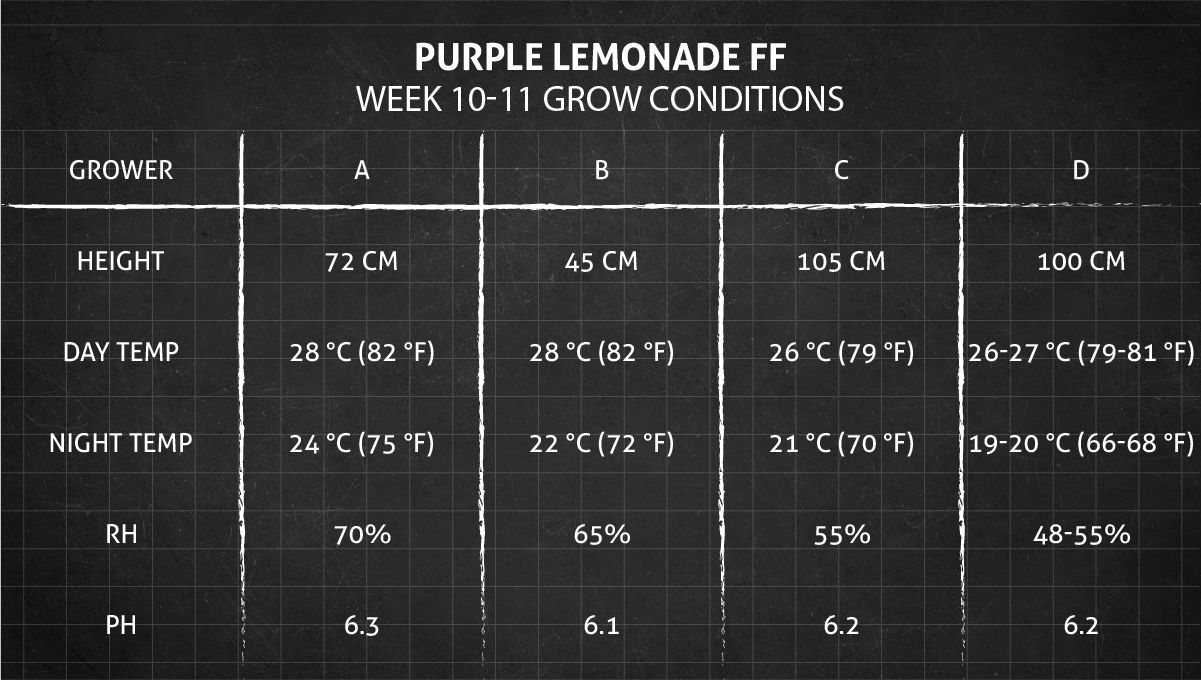
As your colas gradually fill out, resembling the enticing images from the seed store, it's easy for less experienced growers to mistakenly anticipate harvest time. However, the buds will continue to expand, enriching themselves with additional psychoactive and aromatic compounds. A telltale sign of immature flowers is the abundance of white pistils surrounding them, indicating further maturation.
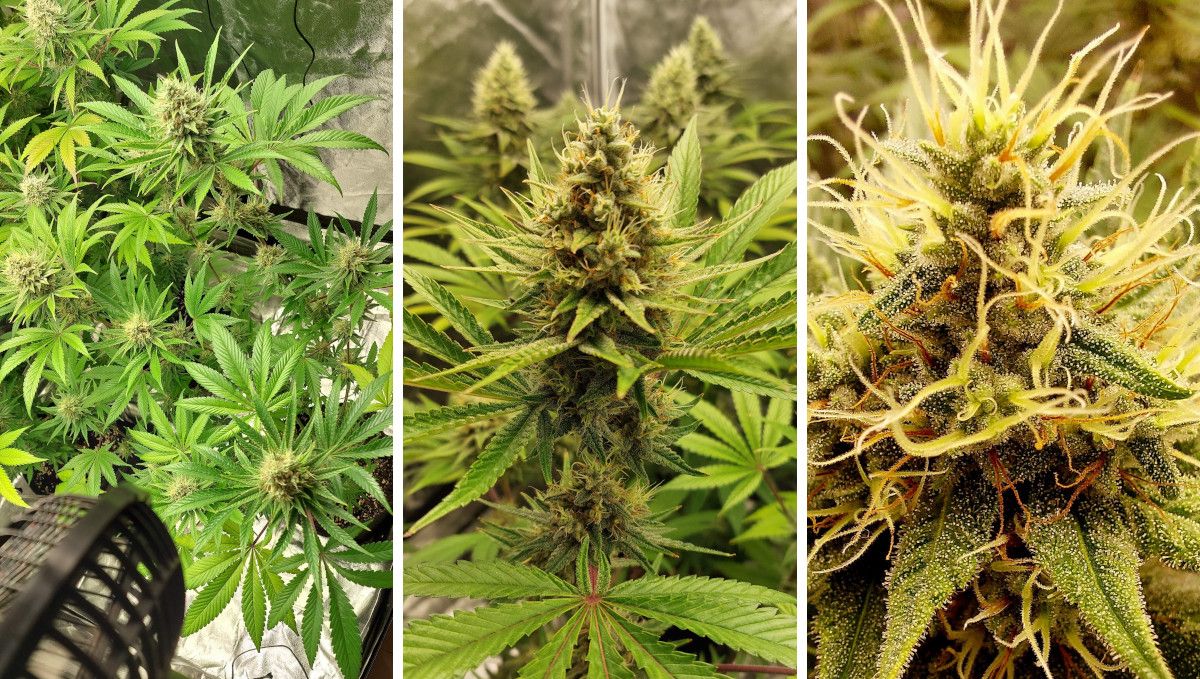
To meet the heightened demand for flowering nutrients, particularly phosphorus (P) and potassium (K), the gardener can augment their plants' diet by introducing a specialized PK booster. With a plethora of PK products available, selecting one that aligns with your cultivation goals is easy. Despite the increased nutritional requirements at this stage, be cautious not to overfeed, as signs of nutrient burn may manifest with higher dosages.
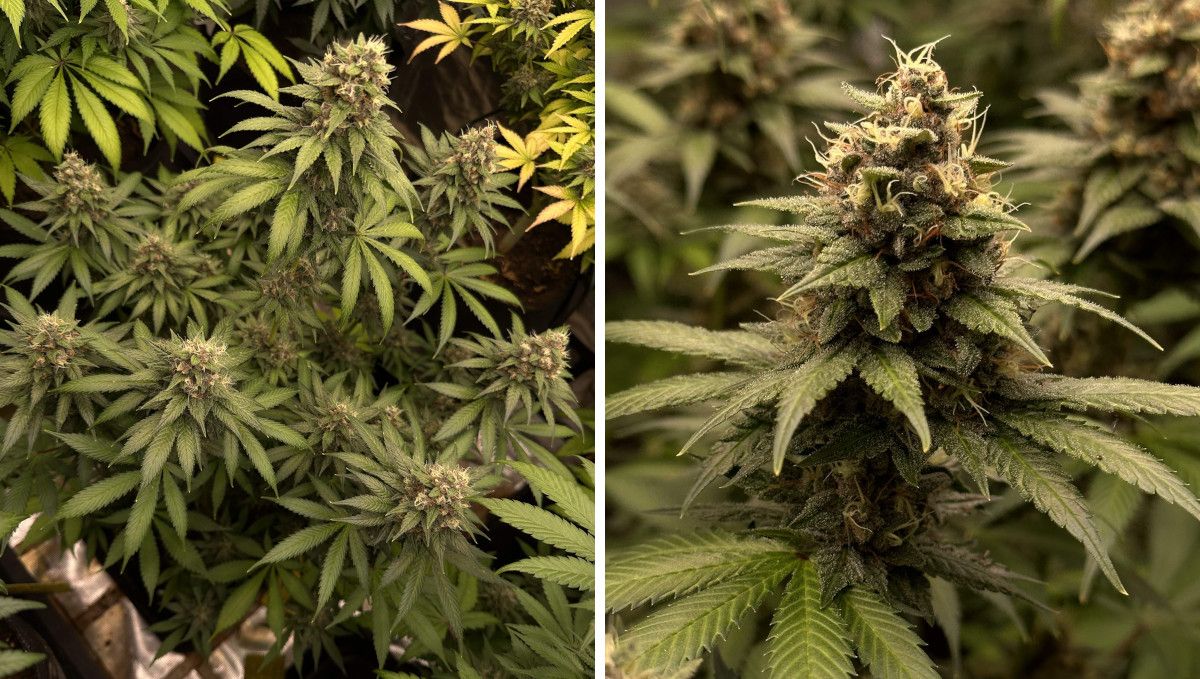
By this point, the flowering stretch concludes, allowing the grower to relax as the plants attain their final size. The threat of overgrowth, once a concern, is now alleviated, and the focus shifts to nurturing the maturing buds.
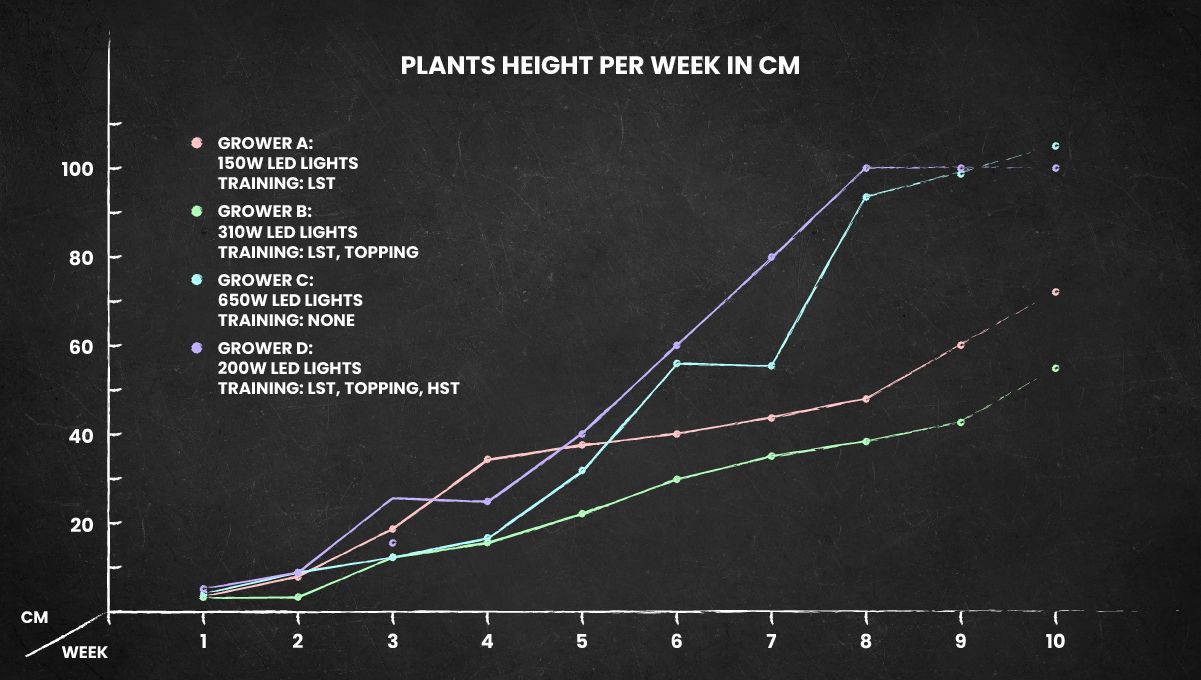
Indoor cultivation thrives under potent lighting, ensuring dense flower clusters and long colas. Powerful lights facilitate optimal flower development even in middle nodes, thanks to good light penetration. However, prioritize the removal of lower nodes (this procedure is called lollipopping) to redirect precious resources to the top buds, maximizing overall yield and quality.
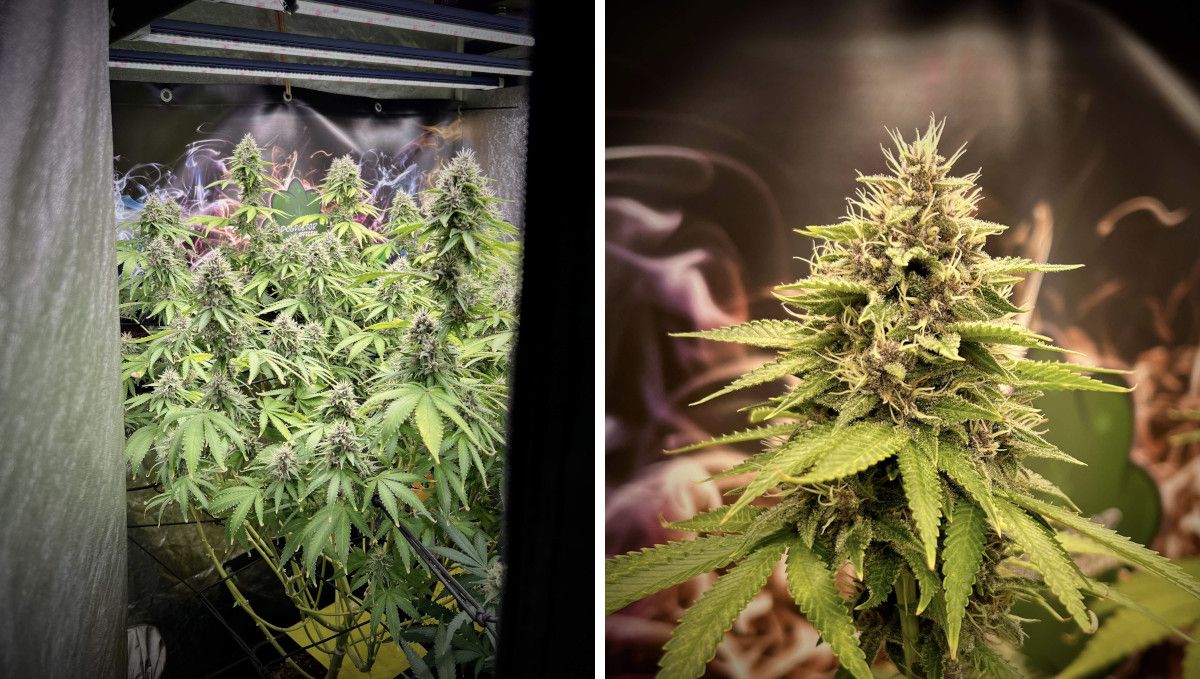
9. Ripening And Harvest | Week 12 (And Beyond)
As the grow cycle draws to its close, do what you can to keep the relative humidity around 35-40% or, if you fail to do this, regularly inspect the buds, especially the largest and densest of them for the signs of fungal infections. If there's a rotten spot inside a flower cluster, the adjacent trim leaves will usually wither and dry out, and that's your clue that something is wrong. You may also want to lower the day temp to around 23-25 degrees Celcius to emulate autumn.
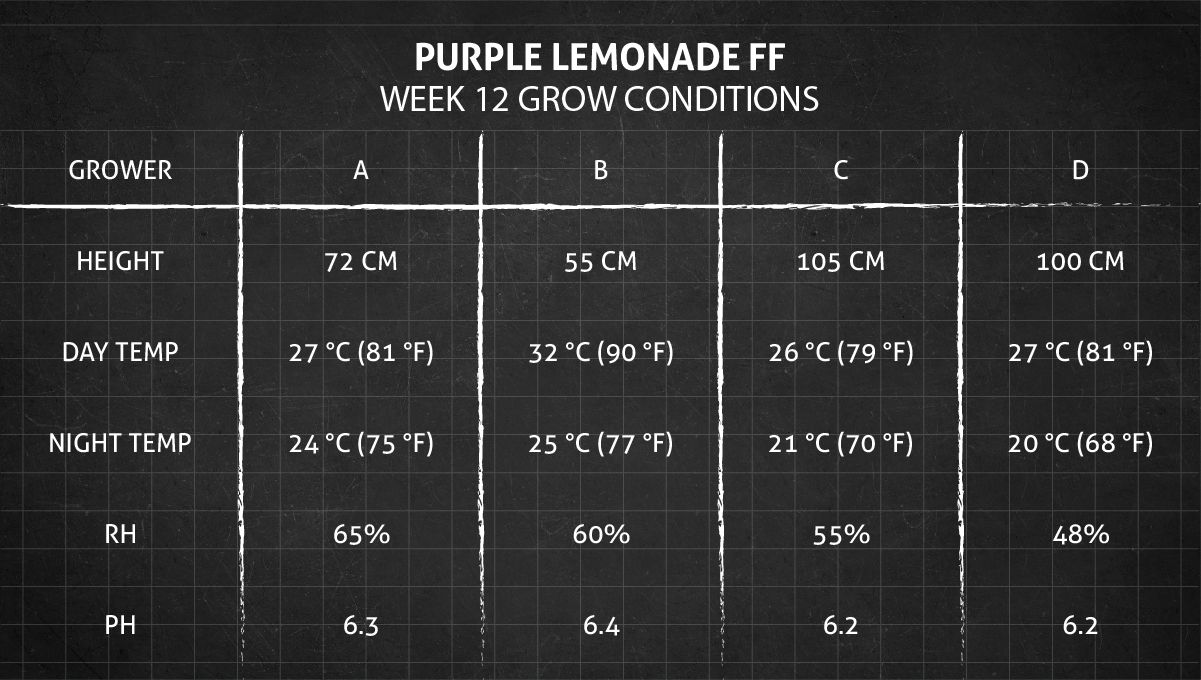
Determining the ideal time for harvest extends beyond the seed seller's specified flowering duration; it demands a nuanced assessment of the plant's actual maturity. If the buds remain adorned with immature-looking white hairs, patience is key, as they are likely far from readiness and require additional time to fully develop.
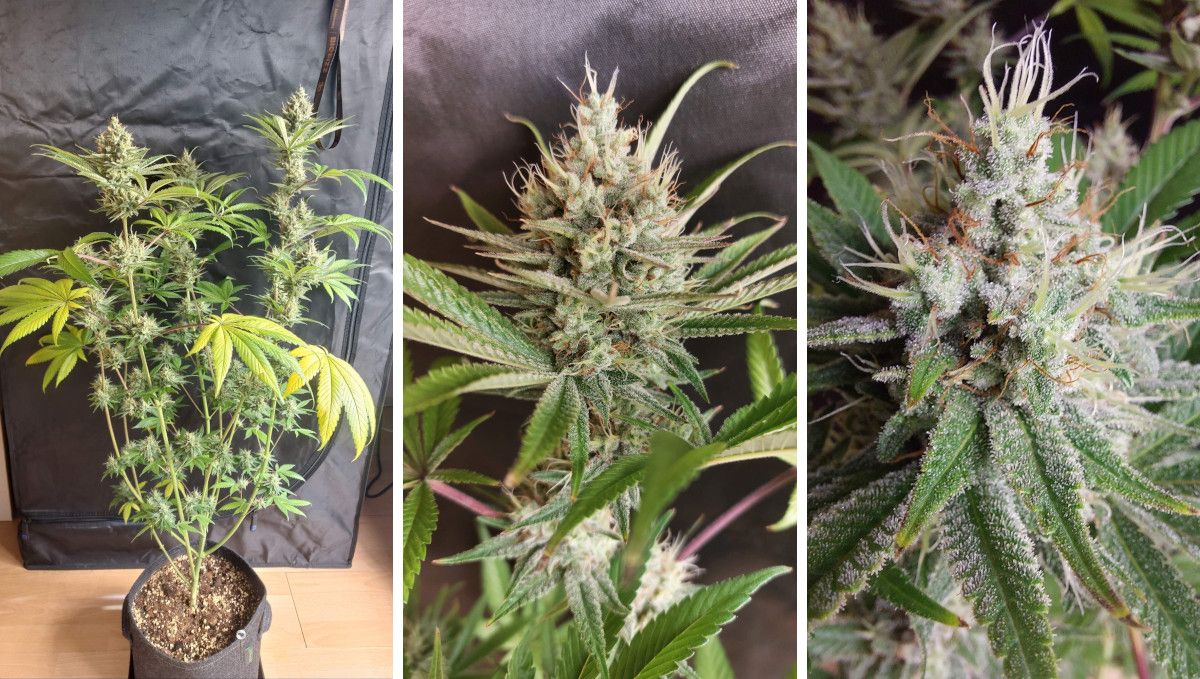
As the grow cycle progresses, a noticeable halt in bud growth may prompt impatience, particularly among beginners. However, resist the urge to prematurely harvest, as invisible transformations unfold within the buds. Despite the apparent stagnation, the buds are getting denser, gaining weight, and accumulating higher concentrations of THC and other active compounds.
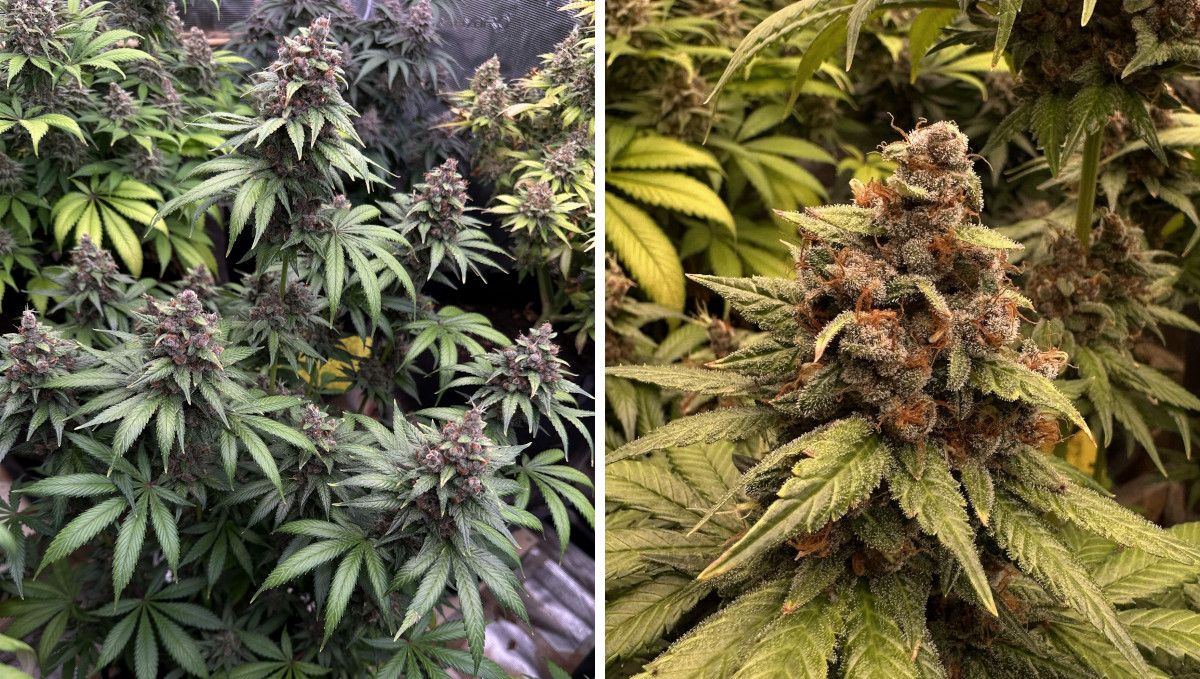
Early signs hint at the approaching harvest, such as the shift in pistil color from greenish-white to brown, orange, or even purple in exotic varieties. Additionally, the gradual yellowing of leaves serves as another indicator. While these symptoms demand attention, none individually serves as a foolproof signal to initiate the harvest.
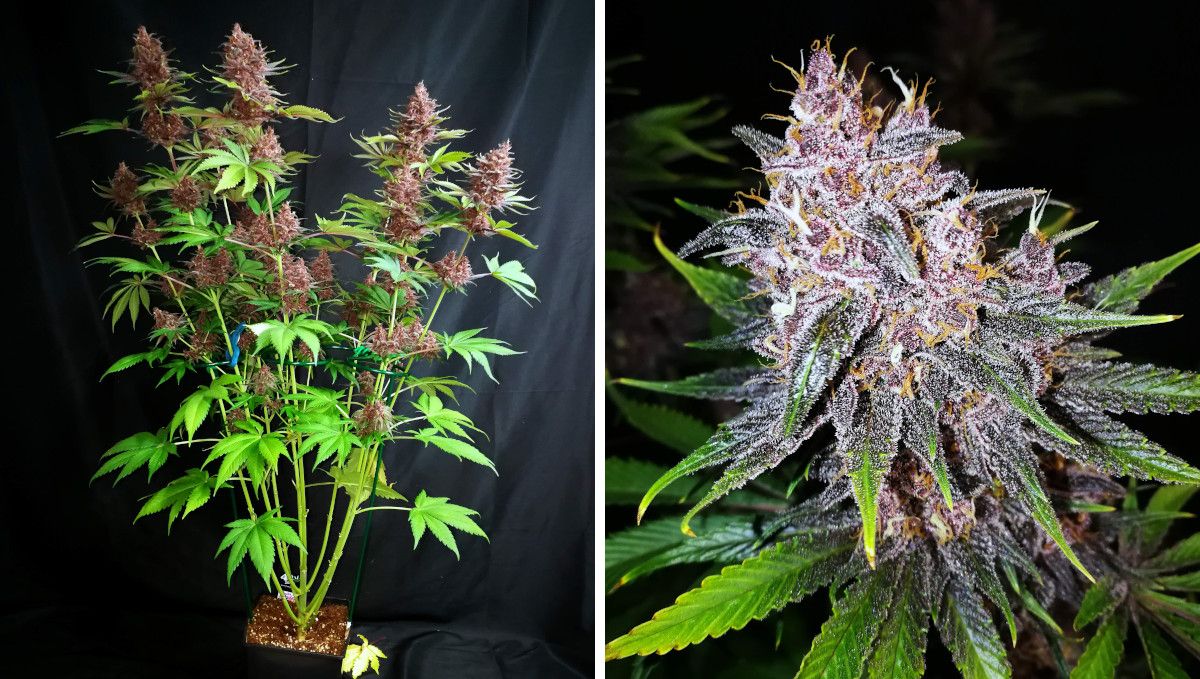
To accurately pinpoint the best moment for harvest, growers must master the most reliable method—examining trichomes up close. Employ a 60x hand microscope or a specialized lens for macro shooting on a smartphone. Mature trichomes appear cloudy, with a scattering of amber ones, providing a definitive sign of readiness.
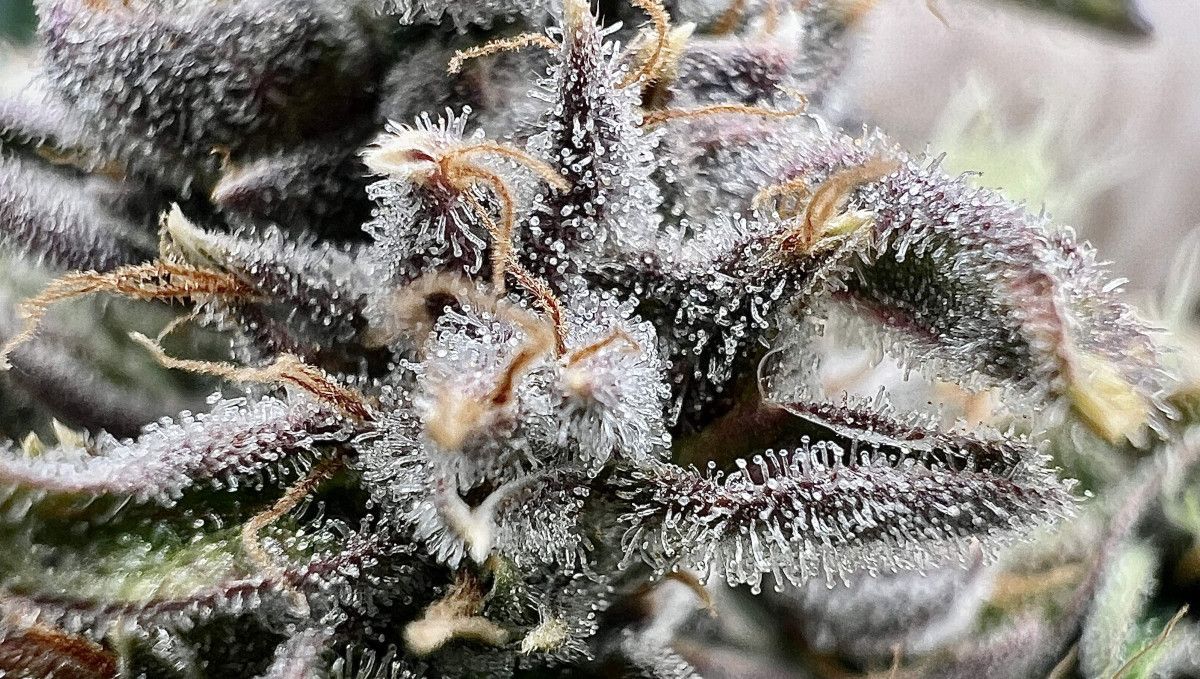
Before the long-awaited harvest day, a crucial step is the final flush. This involves a substantial watering with ample runoff or normal watering without added nutrients. The flush cleanses both the medium and the plant of residual chemicals, requiring about a week in hydroponics and up to two weeks in soil grows.
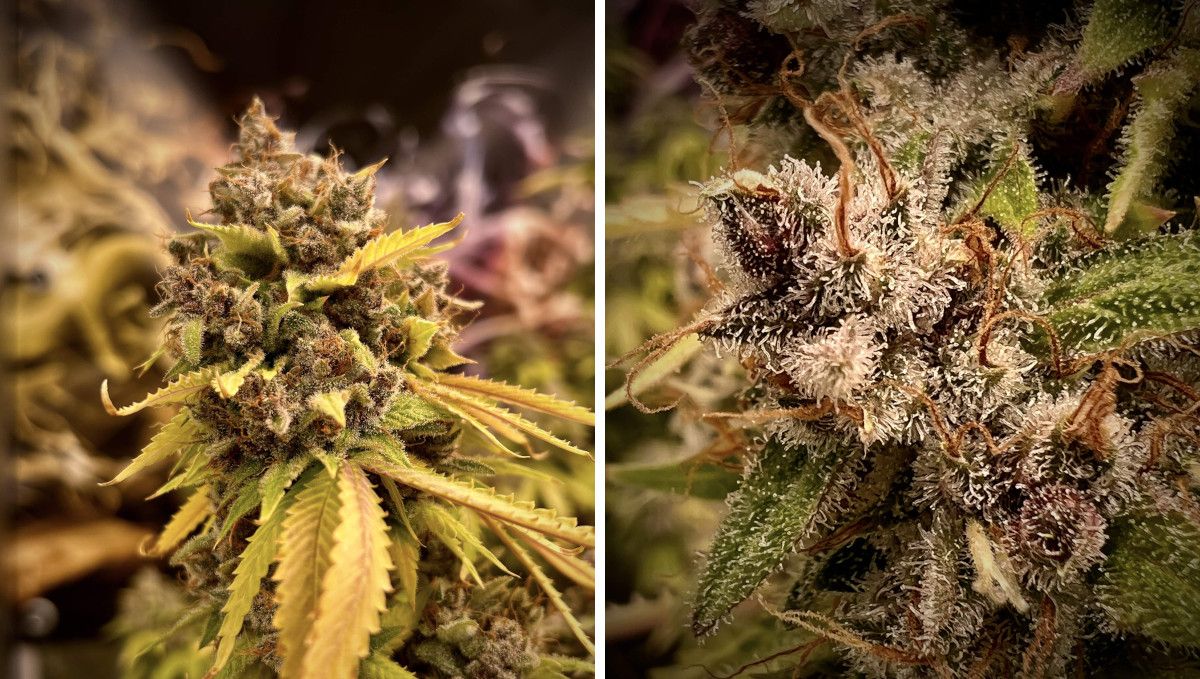
Harvest marks a pivotal point, but the cultivation journey doesn't conclude here. Post-harvest, many beginners falter by compromising smoke quality by being impatient. We emphasize the importance of a slow drying process followed by curing in glass jars for at least 2-3 weeks. This critical phase enables essential chemical processes to persist, ensuring the smoke achieves the finest flavor and highest potency.
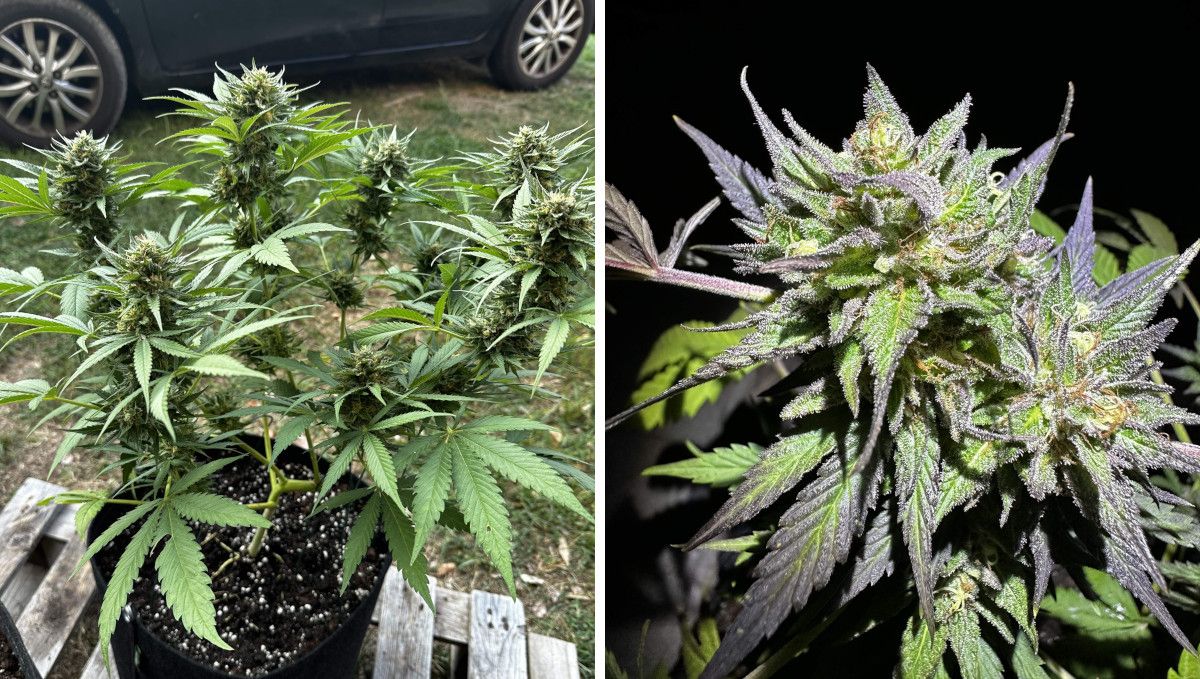
10. The Outcome
The end results of all 4 Purple Lemonade FF grows that we've been following were quite impressive, especially considering that none of the gardeners have extended the vegetative period too much and that the whole cycle duration was comparable to autoflowers.
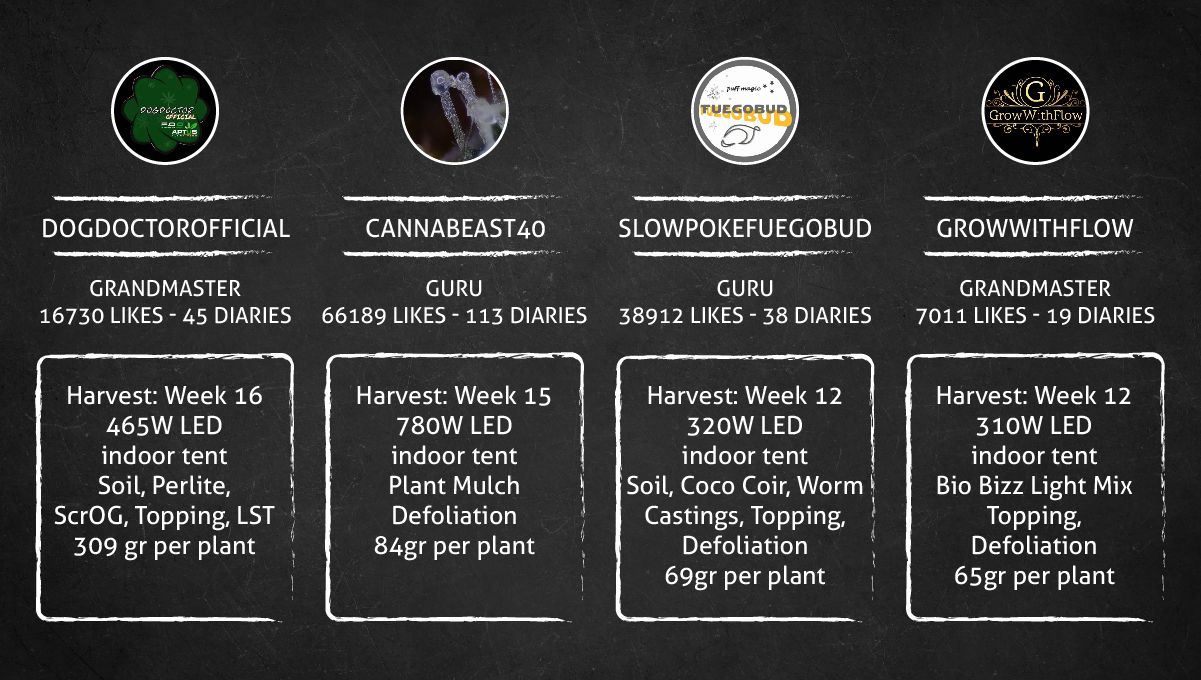
Purple Lemonade FF Yield
Grower A harvested many oversized and heavy colas which got him 309g (10.9 oz) when dried an cured.
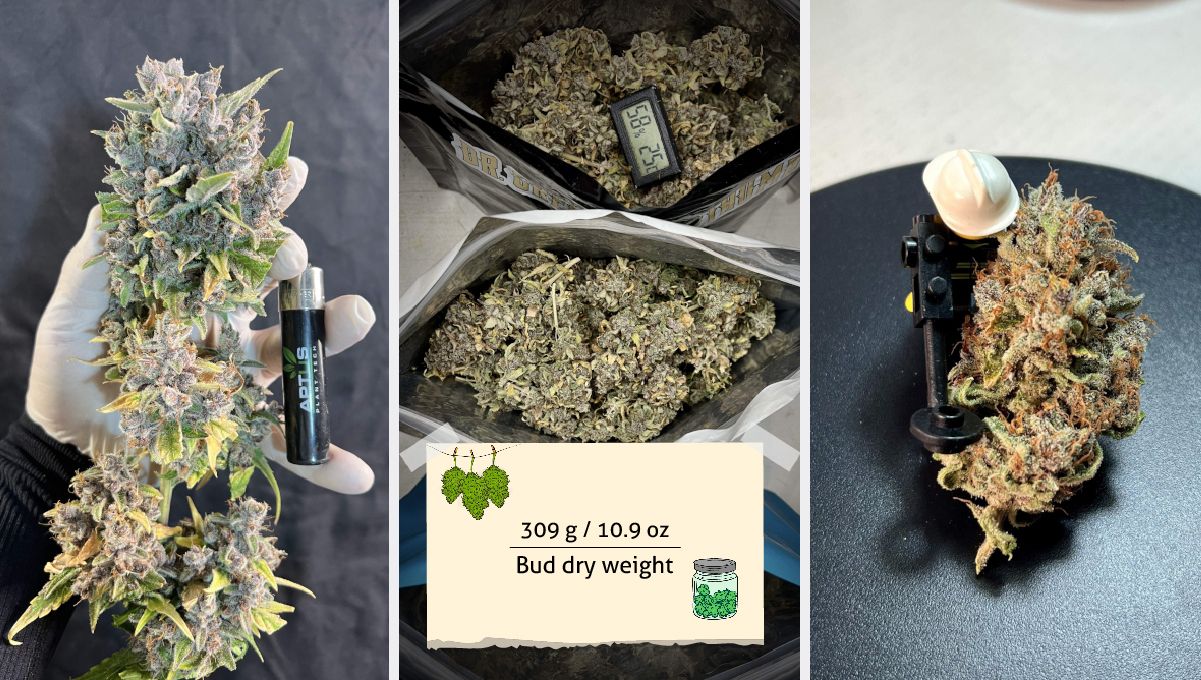
Grower B's yield was quite generous as well – 539g (19.24 oz) of top-notch deep-purple buds from a single plant.
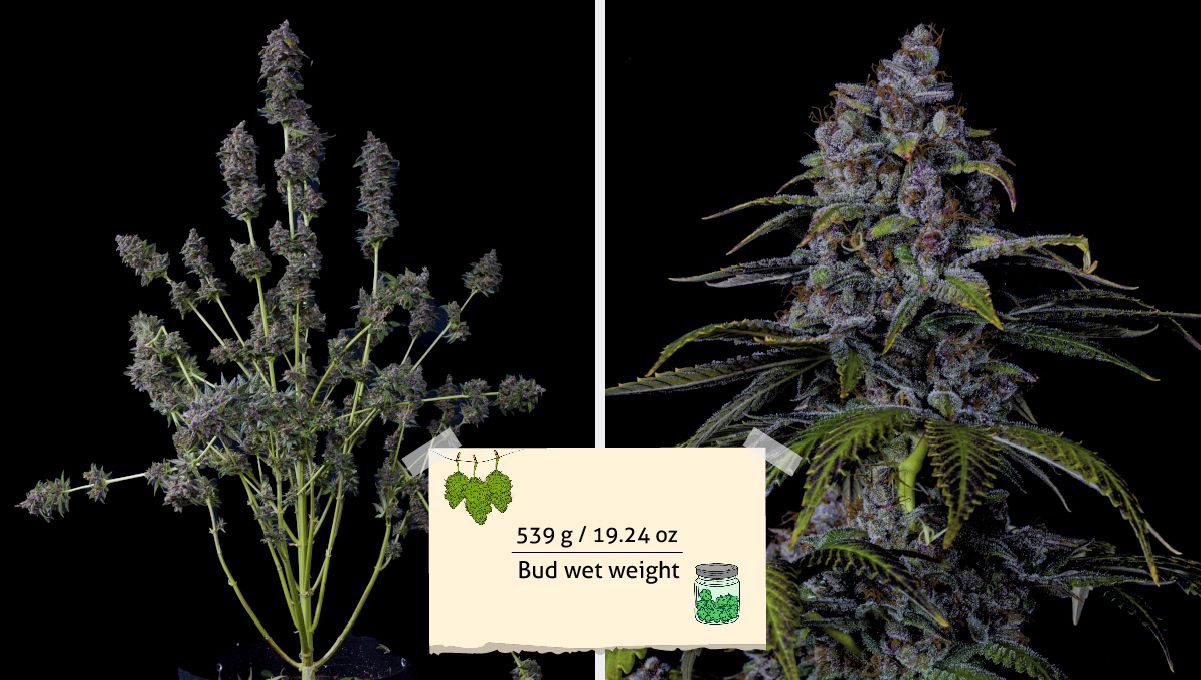
Grower C's plant had the same exotic deep purple coloration and brought 450g (15.87 oz) of well-trimmed bud.
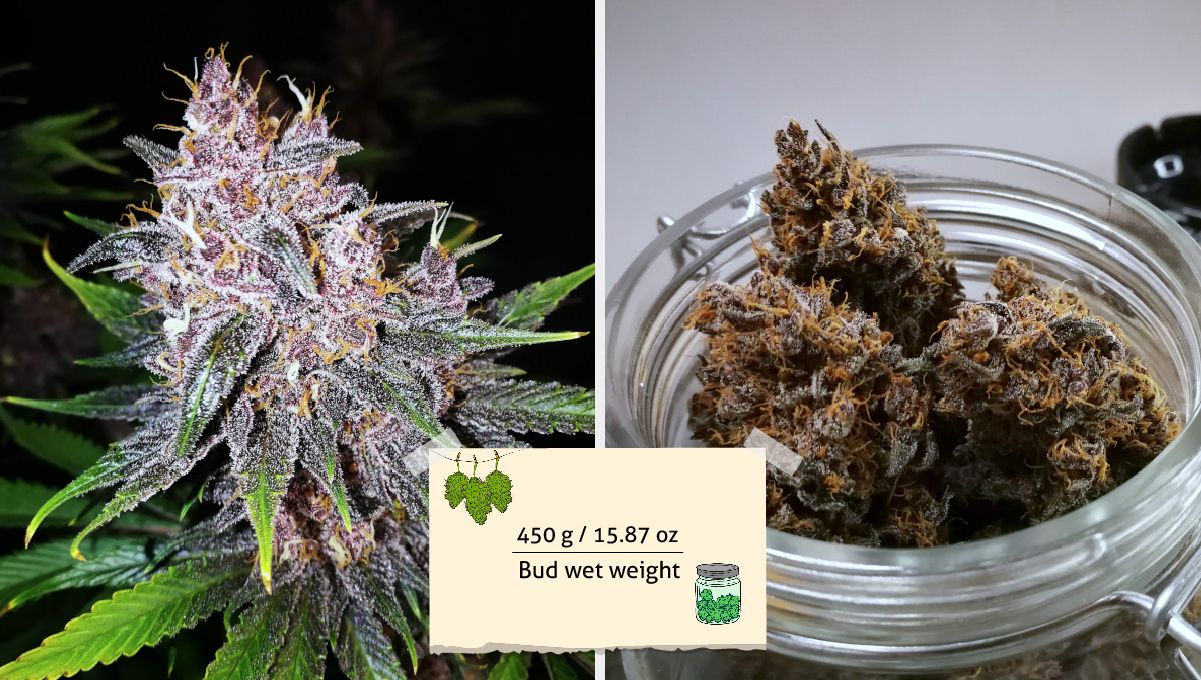
Finally, Grower D's plant had a different hue – with more purple coloration on trim leaves rather than flowers – but those were super firm and sticky and weighed 425g (15 oz).
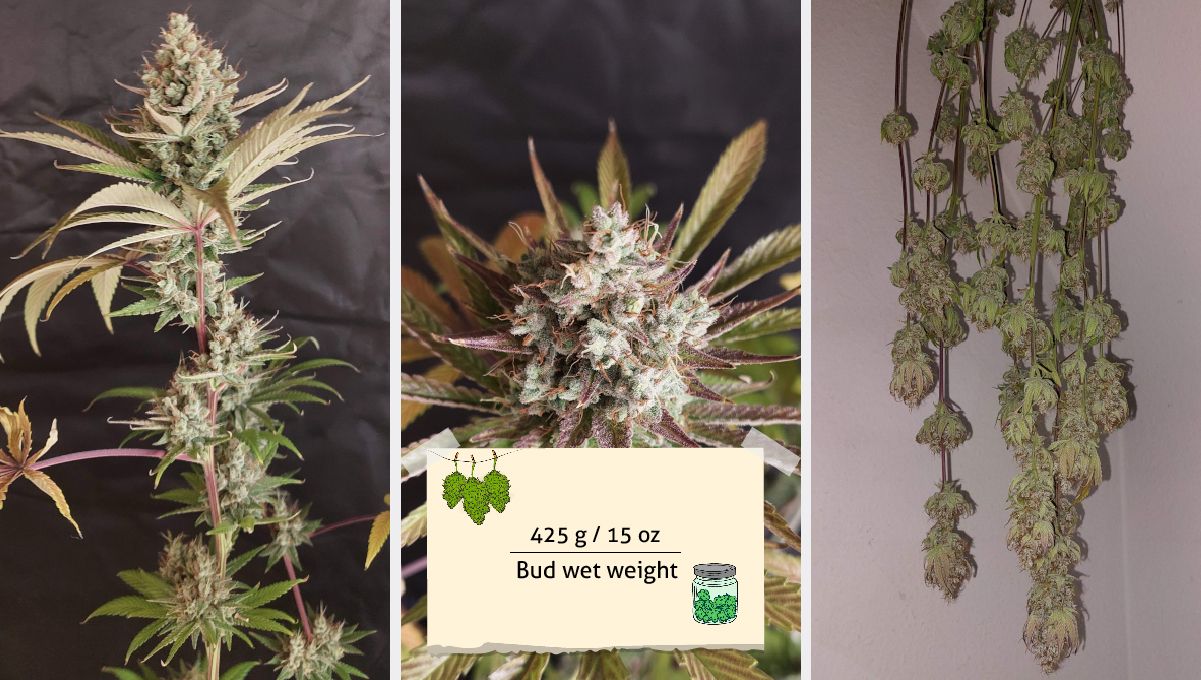
Purple Lemonade FF Smoke Report
The reviews for Purple Lemonade FF consistently highlight its potent and enjoyable qualities. Smokers praise its delightful taste, describing it as slightly fruity with hints of lemon and lime, often likened to a citrus soda. The effects are consistently noted as relaxing, uplifting, and motivating, inducing happiness and creativity. Users report red eyes and a dry mouth as side effects. Whether for creative endeavors or as a mood booster, Purple Lemonade FF is recommended for use during the day.

The taste is consistently described as a mix of sweet and citrusy, making it a flavorful and resin-rich choice for enthusiasts. Overall, the strain's appeal lies in its robust growth, impressive effects, and remarkable sensory experience.
11. In Conclusion
For growers accustomed to autoflowers, Purple Lemonade Fast Flowering will seem indeed fast enough and won't try their patience as it will require just a couple of extra weeks compared to an average auto. On the flip side, you get a plant that has even more tolerance for high-stress training methods than Fast Buds' autoflowering varieties.
The strong genetics of this strain manifest already in early veg, as young plants show no mutations and just develop smoothly and vigorously from the start. We strongly recommend such canopy management techniques as topping and LST – less for the sake of height control and more for the purpose of getting a bushier plant and a heavier yield. Having said that, Purple Lemonade FF has a balanced hybrid structure – open enough to facilitate light penetration but not too tall to make growers with small spaces nervous.
There are enough deep purple phenotypes for everyone, and if you get a lighter shade, it will be arguably even more beautiful – with a perfect pinkish blush shining through an abundant layer of trichomes. Some of the phenos are also quite easy to trim, and all have a great bag appeal when dried and cured. We wish everyone generous yields with our Purple Lemonade Fastflowering!











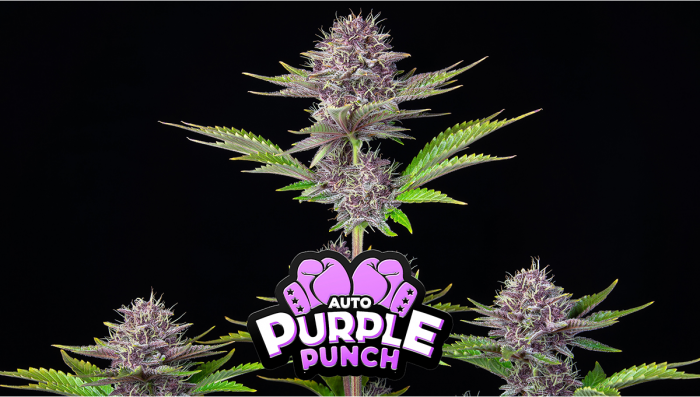
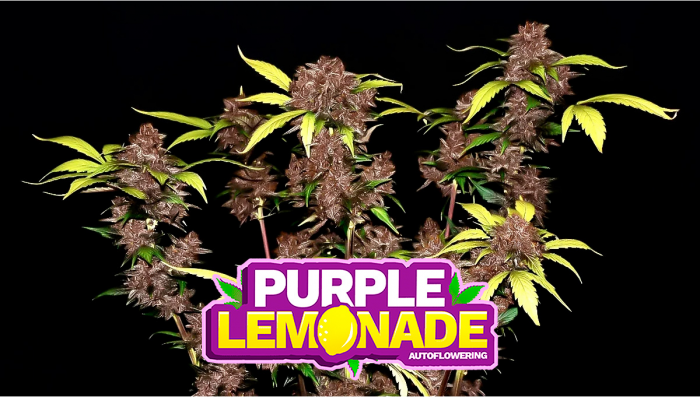
Comments